Veterinary & Biosecurity
Uganda Commemorates One Health Day with a call for a Multi-Sectoral Approach to address emerging health threats
Published
1 year agoon
By
Mak Editor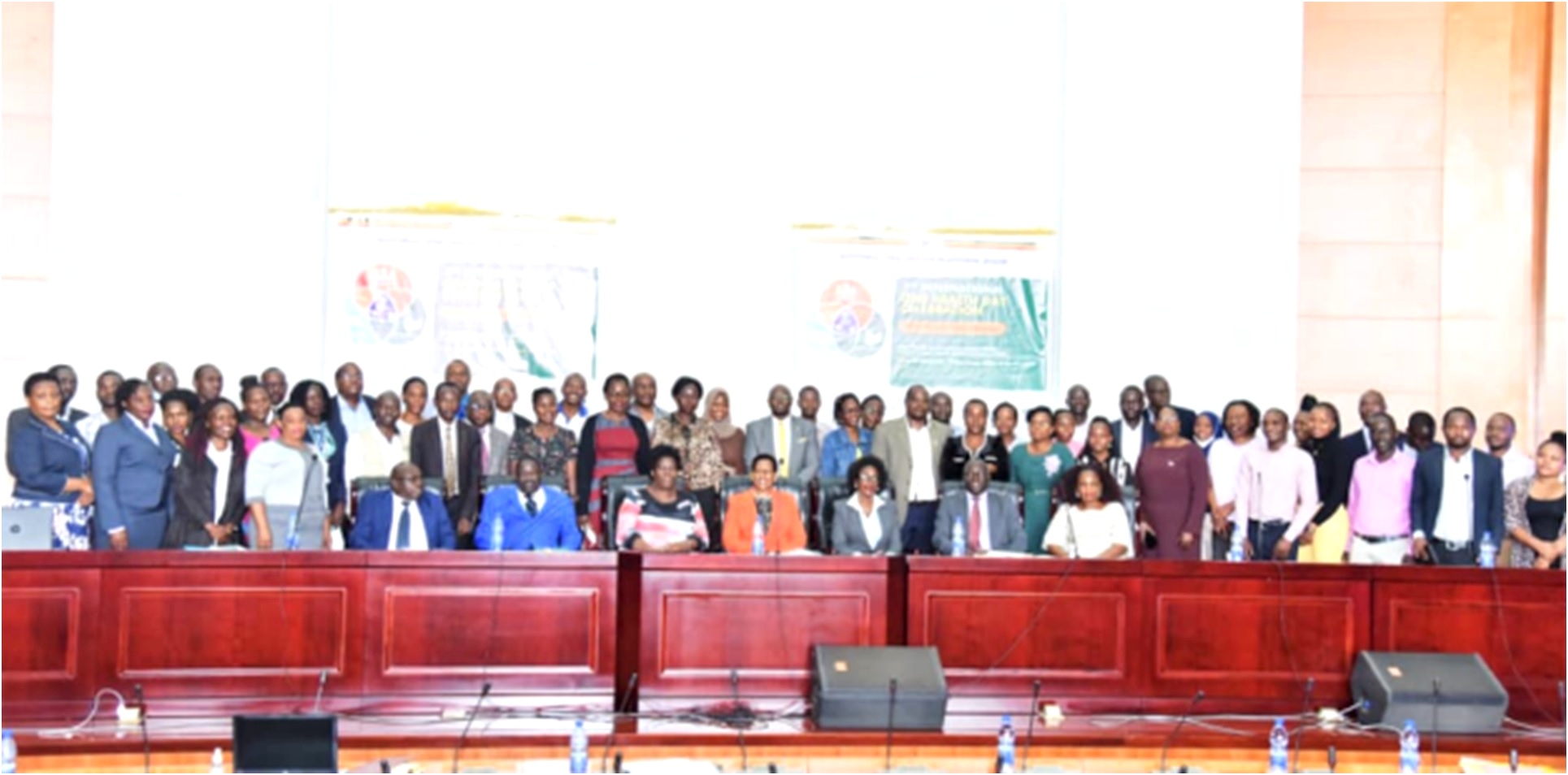
By Joseph Odoi
On 3rd November 2022, Uganda joined the rest of the world in celebrating One Health Day. This year marks the seventh annual One Health Day, a global campaign that celebrates and brings attention to the need for a One Health approach to address shared health threats at the human-animal-environment interface.
One Health Day is an initiative that gives One Health advocates and practitioners around the world a powerful voice for moving beyond provincial approaches to emerging zoonotic infectious diseases, antimicrobial resistance, climate change, environmental pollution, food safety, comparative/ translational medicine and many other problems, to a holistic, One Health, way of thinking and acting for the benefit of all living creatures.
While giving a keynote speech at Presidential Hall in Kampala under the theme “Our Planet, Our Health” at the Office of the President in Kampala, Dr. Lawrence Mugisha, an Associate Professor at Makerere University College of Veterinary Medicine, Animal Resources and Bio-Security (CoVAB) in a special way welcomed participants to the One-Health day celebrations. He noted that there’s urgent need for all sectors to work together if emerging and re-emerging infectious diseases and other public health threats are to be addressed.
“The challenges we face today whether health-related like emerging and re-emerging infectious diseases or public disasters like flooding, drought among others are complex, cross-cutting and cross different borders requiring one health approach which is multidisciplinary that facilitates collaboration, coordination and communication among different professionals/disciplines to address the public health events quickly. This helps to quickly identify appropriate interventions timely and use available resources effectively,”
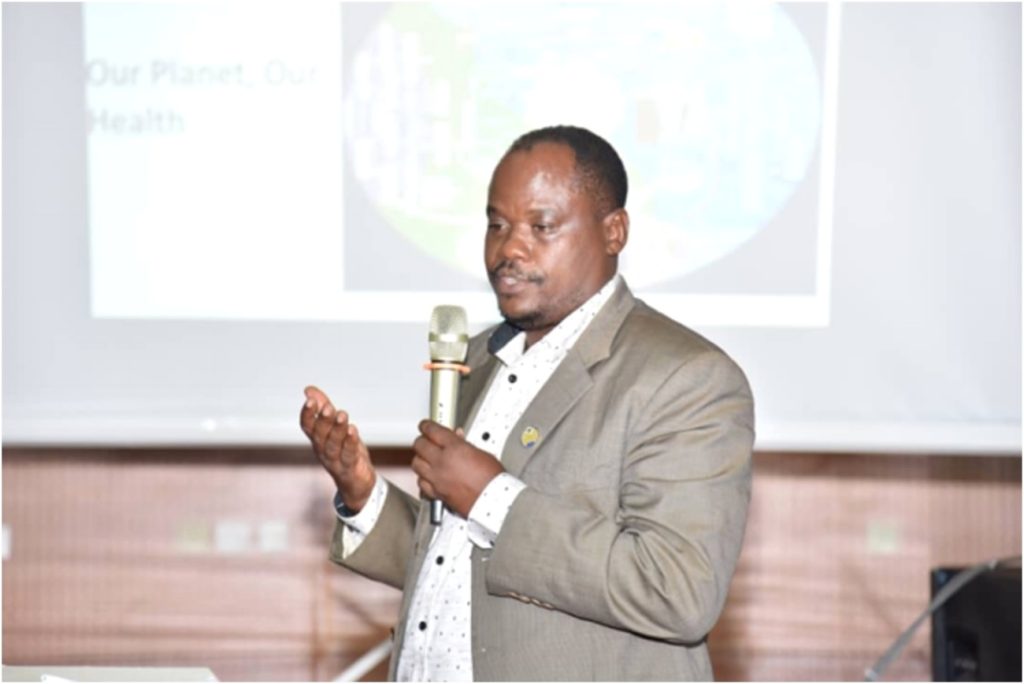
Citing WHO data, Professor Mugisha noted AMR one of the emerging public health challenges which if left unchecked will contribute to 10 million deaths per year
To address these challenges, Prof.Mugisha recommended the following
- Raising public awareness about AMR and AMU
- Promoting water, hygiene and sanitation
- Enhanced AMR/AMU Surveillance in humans, animals and environment
- Investing in human capital for innovative research in vaccines and alternative therapeutic approaches like herbal use for the replacement of Antibiotic use.
In her presentation titled; Progress of Implementation of the anti-microbial resistance national action plan, Dr. Hellen Byomire Ndagije from National Drug Authority emphasized the importance of raising awareness to combat anti-microbial resistance adding that national drug authority has been holding Meetings to raise awareness of antimicrobial stewardship (AMS) and antimicrobial resistance (AMR) among health workers in pharmacies, and drug shops both human and animal medicine use
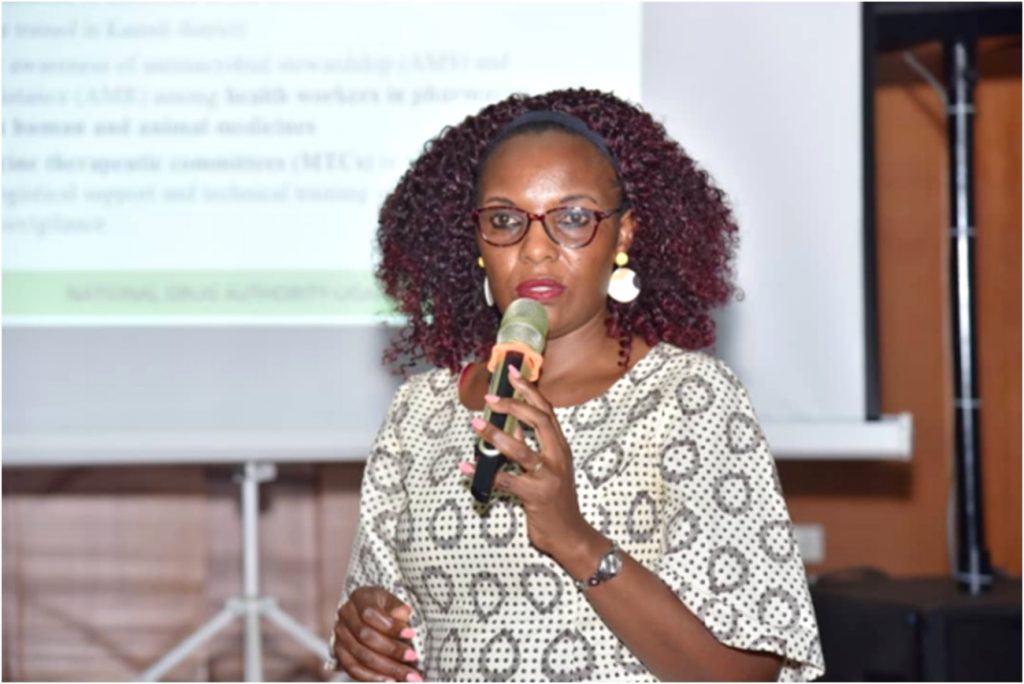
As part of capacity building to address AMR, she supported strengthening the Medicine Therapeutic Committees (MTCs) in regional referral hospitals with logistical support and technical training on rational medicine use and pharmacovigilance. In terms of antibiotics demand, she noted Uganda currently imports over 50,000 kilograms which should call for close vigilance.
To promote optimal access and use of antimicrobials, she recommended regular and risk-based testing of imported antimicrobials and medical equipment to assure their quality. She emphasized the need for good distribution practice standards to guarantee that antimicrobials are restored and dispensed in a way that does not compromise quality or efficacy. She said there was need to promote good manufacturing practices (GMP) inspections for both foreign and local drug manufacturers to ensure compliance to quality standards of manufacture, in addition to enforcing compliance monitoring and support supervision of human and veterinary drug outlets to ensure compliance to drug regulatory requirements.
As a way forward, she made recommendations that included the strengthening of stakeholder engagement, awareness, training and collaboration. The need for improved access to quality, safe and efficacious antimicrobials was emphasized in addition to strengthening pharmacovigilance: reporting ADE (AMR surveillance)
Dr. Ndadije stressed the need to promote rational use of drugs as well as investing in research and innovations
In her presentation, Dr. Lydia Nakiire under the Project titled 7-1-7 timeliness at Infectious Diseases Institute, Global Health Security Program said the Ministry of Health conducted a pilot study, ‘To Save Lives’ through Infectious Diseases Institute to identify bottlenecks causing delays in detection, notification and response.
During the study, she said, it was observed that application of One Health during responses to public health emergencies was one of the major enablers for timely initiation of early response. ‘’Recent outbreaks like Ebola Sudan virus disease and COVID 19 make it necessary to review the lessons learnt from recent public health events, reevaluate approaches and develop frameworks to measure progress towards making the world safe from public health threats.
The 7-1-7 framework proposes timeliness matrix with defined targets; 7 days to suspected outbreak detection, 1 day for public health authorities to be notified and the investigation is initiated within 7days. The 7-1-7 metric can supplement existing capacity measurements of the International Health Regulations (2005), including the Joint External Evaluation and Global Health Security Index’ explained Dr. Nakiire.
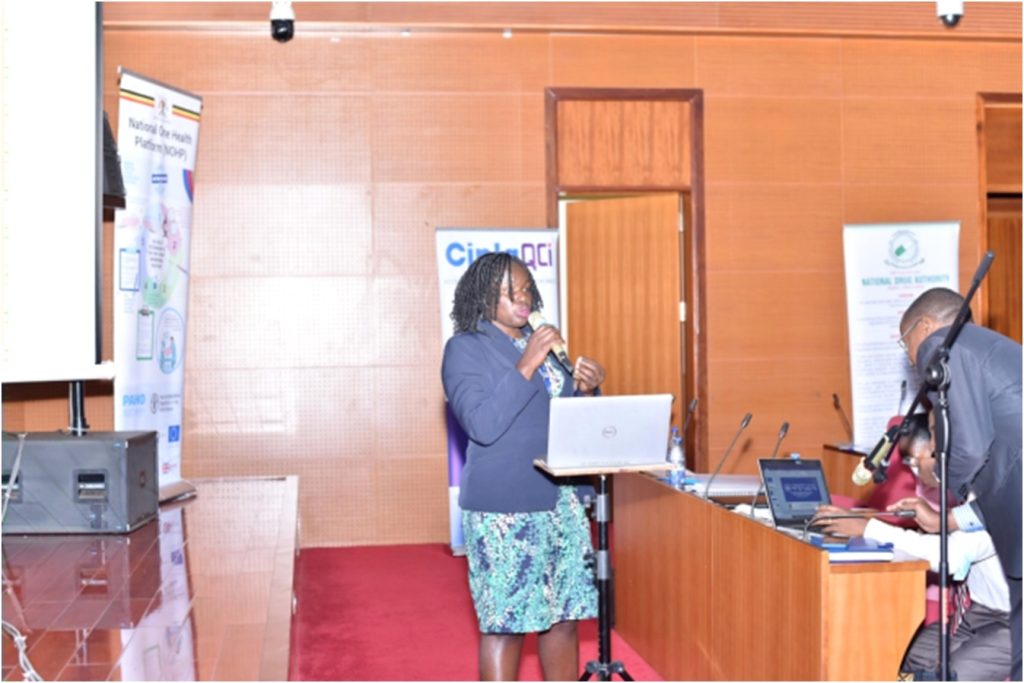
In his presentation on behalf of Dr. Immaculate Nabukenya, Senior Project Manager, NAPHS A-Team Uganda Herbert Bakiika shared the progress of Implementation of the Uganda National Action Plan for Health Security (NAPHS) and 2022 Operational Plan.
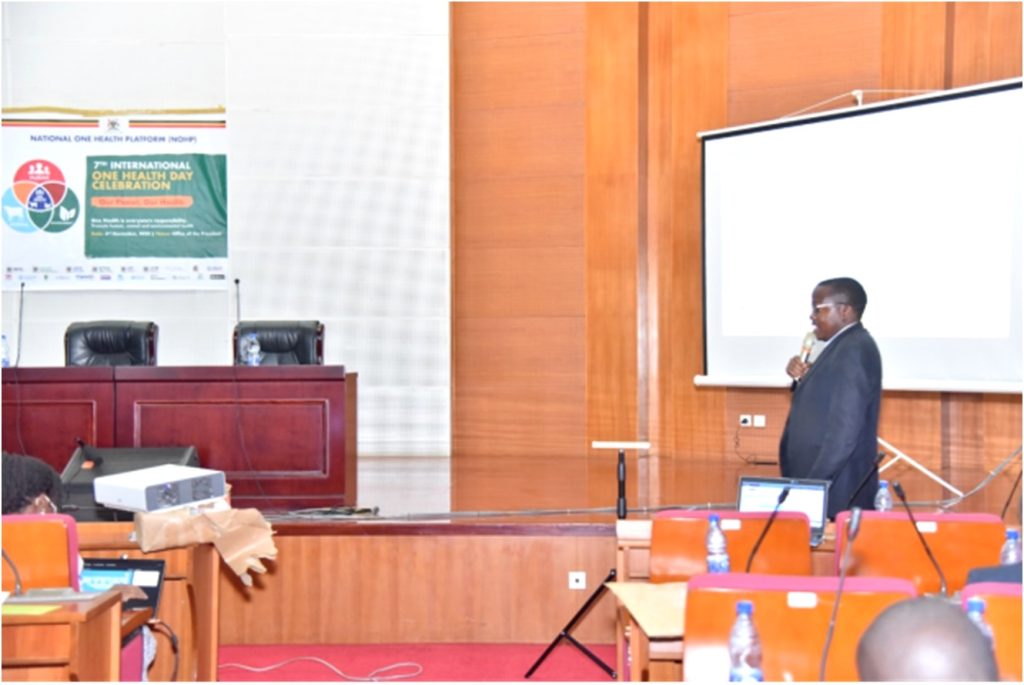
He noted there is progress in the following as mechanism of addressing AMR, and that the guidelines for mandatory license were drafted, but not approved. He further said that decentralizing One Health in 50 districts by 2024 to strengthen coordination of surveillance and response to zoonotic diseases was underway. Uganda committed to achieving demonstrated capacity in at least 3 technical areas by 2024.
He said the other milestone was licensing of all laboratories across animal, human, food, nuclear and chemical sectors by 2024 to strengthen the national laboratory network. On how this will be achieved, she said government was to liaise with professional councils to license laboratories in line with basic Quality Management Services (QMS)
Dr. Jonathan Mayito from Uganda Fleming Fund highlighted Inadequate human resources in the microbiology laboratories, Irrational and overuse of antibiotics, Lack of AMR data sharing across one health sectors, Lack of structures response to the emerging AMR epidemic as some of the challenges that needed to be addressed.
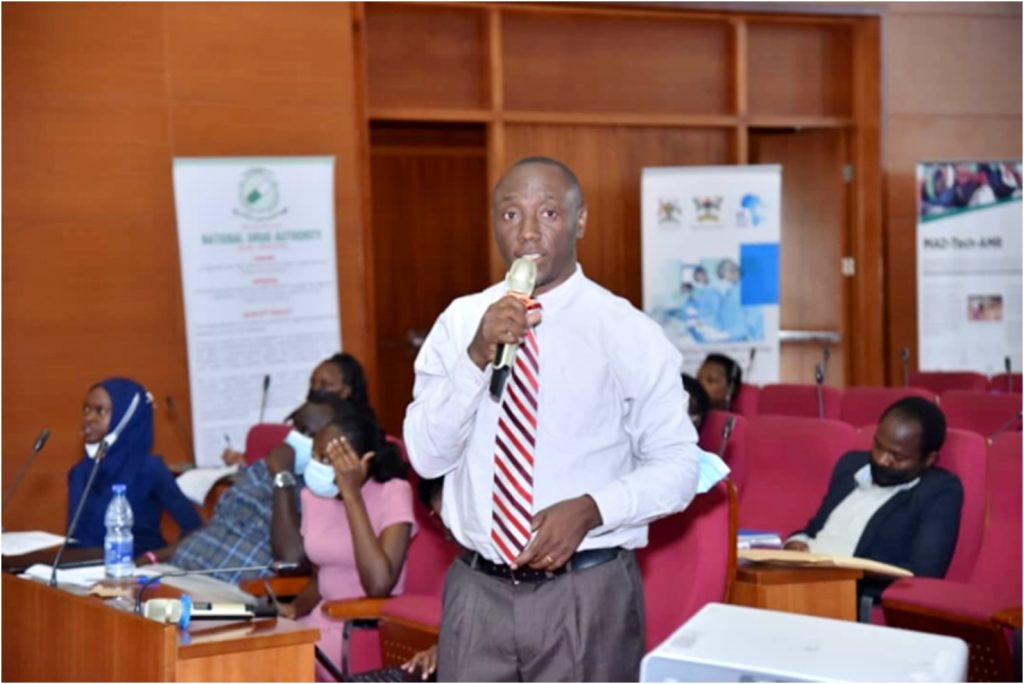
Moving forward, he recommended streamlining the supply of microbiology supplies by National Medical Stores, Increase human resources allocation through public service commission, data sharing agreement to enable data sharing to inform strategies and above all creating a National Task Force to investigate and respond to AMR alerts/outbreaks.
The Food and Agriculture Organization of the United Nations (FAO)’s Country Director, Bessong Willington emphasized the importance of capacity building to support timely intervention when addressing disease outbreaks. He called upon different sectors to work collaboratively and in a multidisciplinary fashion under the One Health Approach.
In his remarks read by Dr. John Opolot, Dr. Henry Mwebesa congratulated participants for marking the one-health day. He that 61% of all existing human infections in the past decade have been zoonotic including Ebola, HIV, and influenza and that 80 % of pathogens could potentially be used for bio terrorism.
In addition, to effectively strengthen One Health initiatives in Uganda, the Ministry of Health has embarked on roll out of the third edition of the integrated disease surveillance and response in over seven health regions using One Health approaches. The ministry, he said, also piloted integrated (both animal and human) sample transportation from communities using the hub transportation network using One Health Approaches.
On the importance of a multi-sectoral approach towards addressing public health challenges, Dr. Mwebesa emphasized the importance of involving all state and non-state actors including civil society and the private sector in one-health programmes.
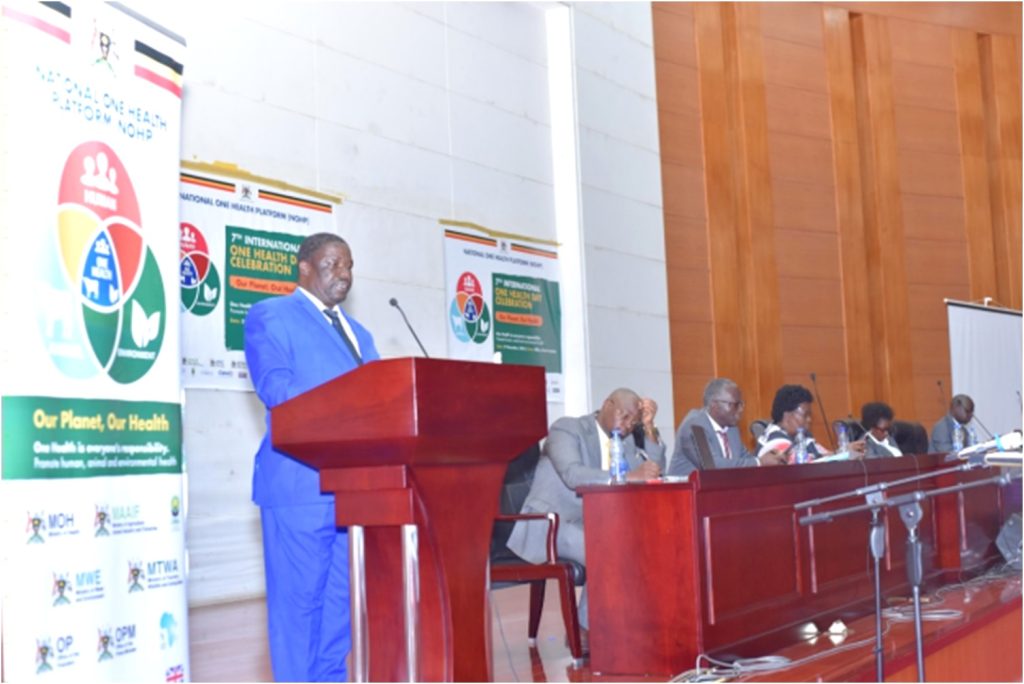
In terms of government commitment, Dr. Mwebesa noted that The Ministry of Health will continue to support the One Health initiative, and currently government is funding division of veterinary public health and zoonoses which is supporting decentralization of One Health in over 30 districts to strengthen multi-sectoral emergency preparedness at sub-national level.
On current outbreak of Ebola, Dr. Mwebesa said The ministry of health shall continue to engage the National One Health platform in the current epidemic and urged all stakeholders to observe standard operating procedures to prevent the spread of Ebola virus disease. He equally thanked development, Implementing Partners and private sector partners for the financial and technical support towards the One Health initiatives as long forward to prevention, detection and response to emerging public health emergencies in the country.
You may like
-


Call For Applications: Masters Support in Brain Health
-
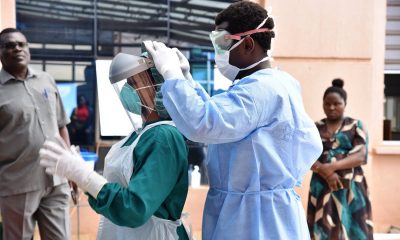

Poorly implemented COVID-19 incentives eroded health workers’ motivation in Africa – Study
-
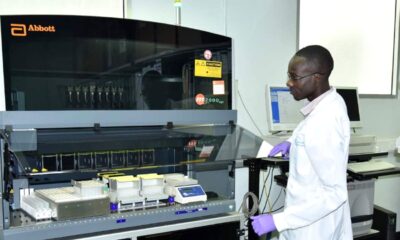

University of Turin Infectious Disease Clinical Rotation or Laboratory Placement
-
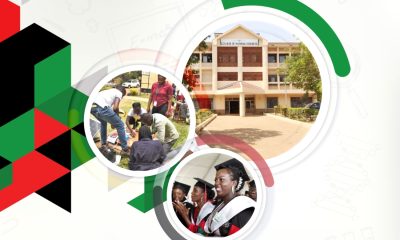

CoNAS Annual Report 2023
-
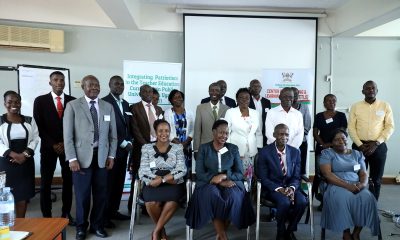

Scholars call for incorporating patriotism in education curriculum
-
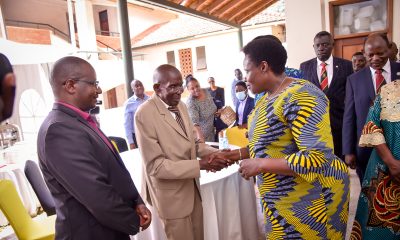

Prof. Justin Epelu-Opio, Our Longest Serving DVC Rests
Veterinary & Biosecurity
Career Guidance session for finalist students held at CoVAB
Published
2 weeks agoon
April 9, 2024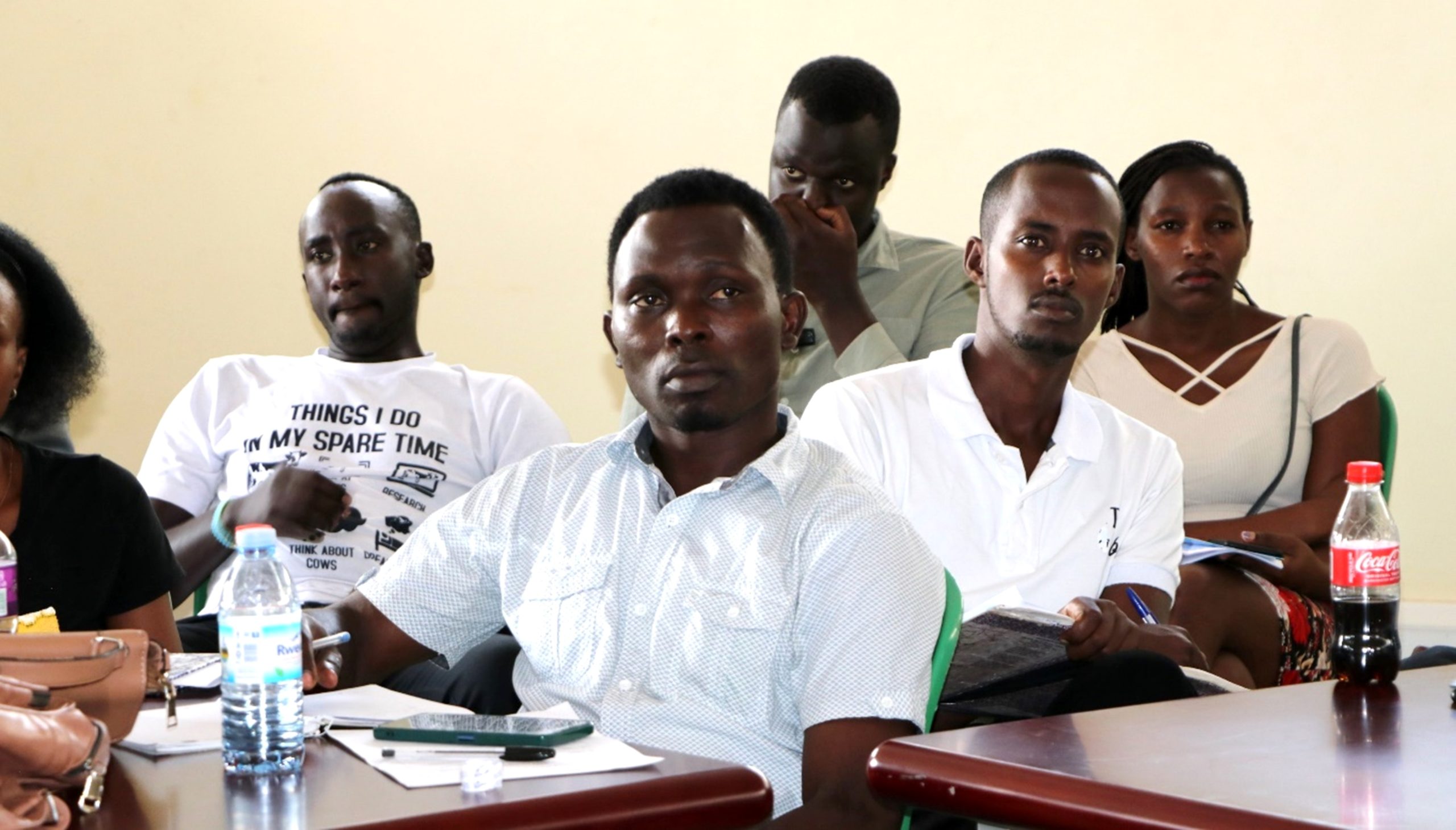
The Livestock and Industrial Resources (LIR) Department at the College of Veterinary Medicine, Animal Resources and Biosecurity (CoVAB) conducted a career guidance session for finalist students of the Bachelor of Bachelor of Animal Production Technology and Management (BAPT) and Bachelor of Industrial Livestock and Business (BILB).
The session held in the Centre for Biosecurity and Global Health (CEBIGH), on Friday 5th April covered several vital areas including writing a curriculum vitae, interview skills, the student’s achievements given the expectations from society, career insights, and employment prospects as well as how to seek out opportunities for further studies.
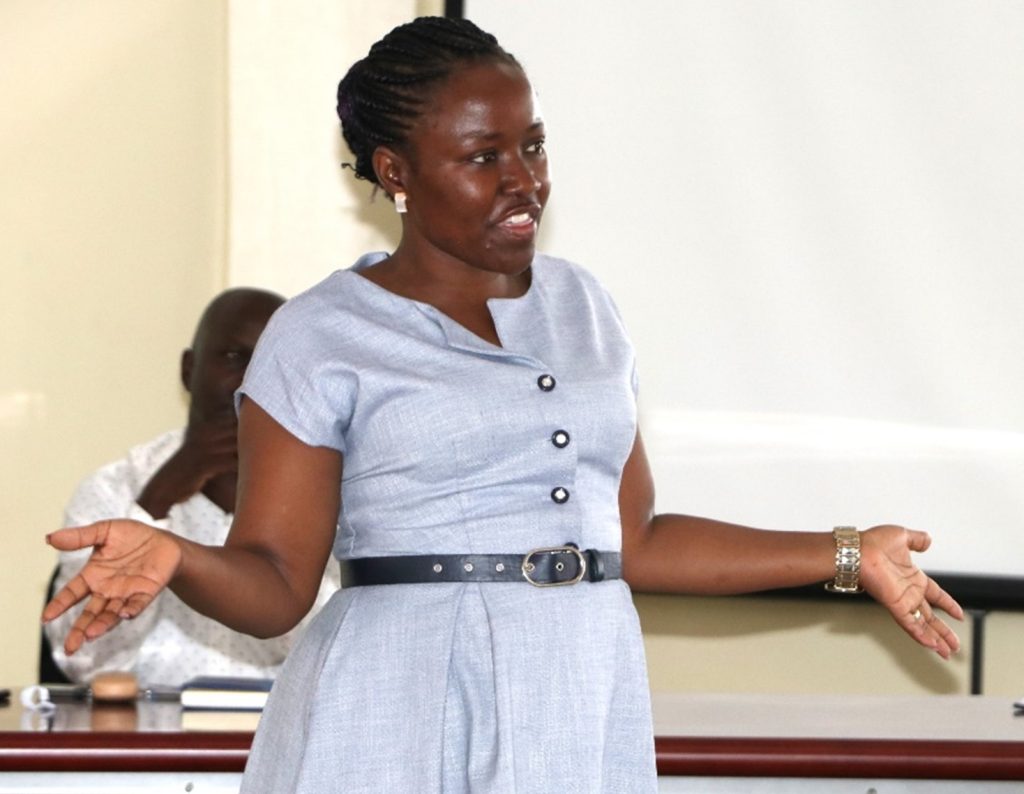
The first of its kind in the unit, the career guidance event was facilitated by experienced academicians many of whom teaching staff at the college specifically drawn from the Livestock and Industrial Resources Department including Professor Anthony Mugisha, Dr. Kizza Daniel, Dr. Herbert Mukiibi, Dr. Dorothy Nampanzira, Dr. Kisaka Joanne, Dr. Azuba Rose. The Industry was represented by Mr. Kibirige Ponsiano, the Chairperson of the Animal Production Society of Uganda.
Dr. Dorothy Nampanzira, Head of the Livestock and Industrial Resources Department reminded the finalist students that once out in the field they were responsible for their day-to-day programming, and that worrying and looking for sympathy or excuses were not applicable. She said there were several people with wide experience in the world of work willing to nurture them citing the example of professors and other facilitators who were lined up to address them and urged the outgoing students to utilize them. She encouraged them to ask as many questions as they could to benefit from the interaction maximally.
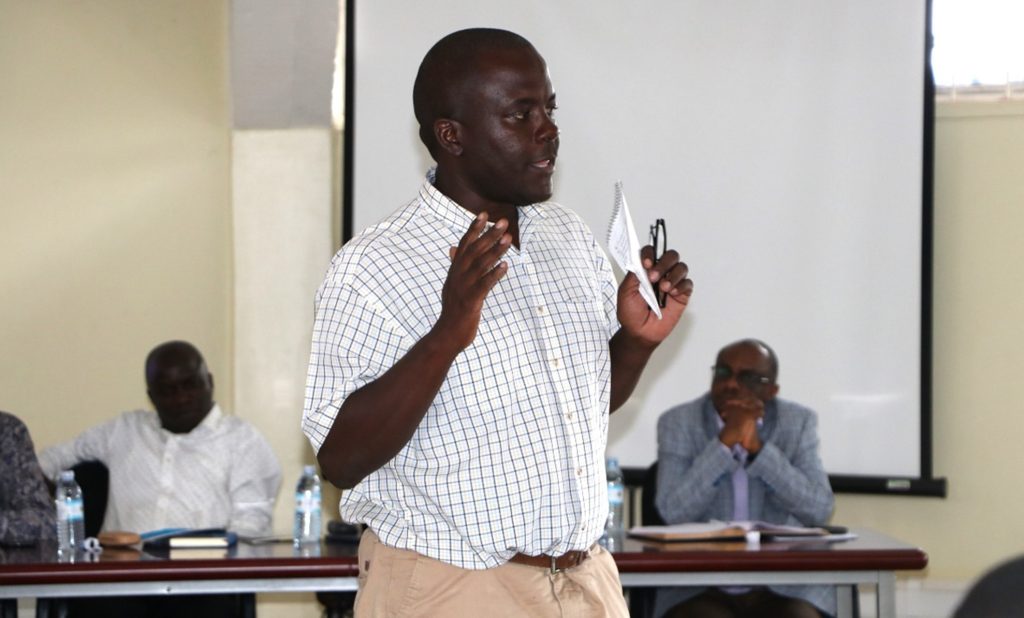
Dr. Daniel Kizza addressed the students on tips for writing a good CV. He said as people hit the world of work for the first time there was a need to find the best ways of marketing themselves using a well-laid-out CV, and he gave them tips on the best-selling format to improve their chances although he said there was no standard format. He cautioned them that many people miss employment because of poorly structured CVs. He further encouraged them to get a mentor who would offer support in areas that are important but were not taught in class. He said while writing the CV, they needed to tell the truth, use headings and subheadings, as well as regularly revise the CV in consideration of whom it is addressed. In the use of persons as referees, Dr. Kizza advised the students to inform them whenever they are used.
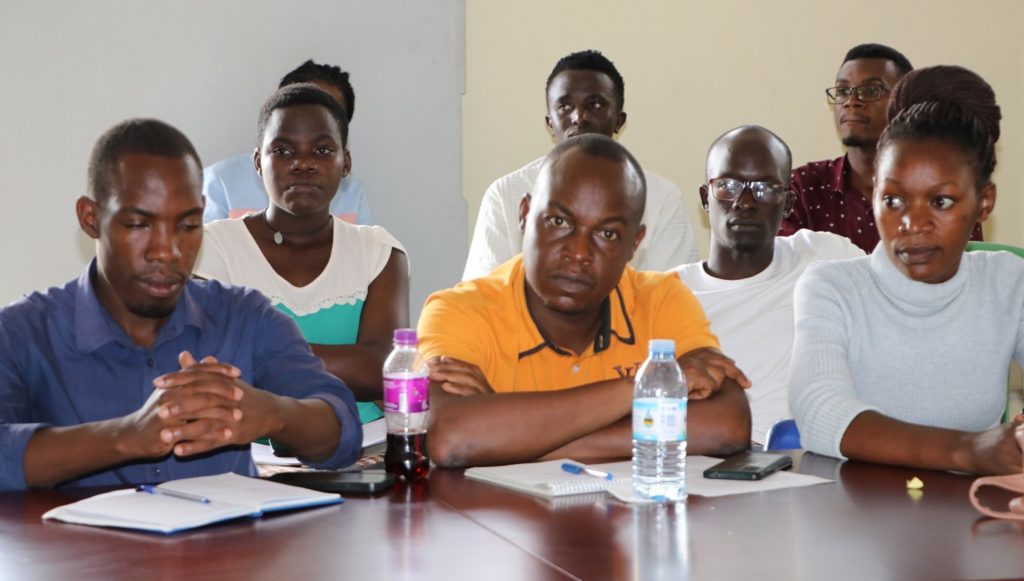
Dr. Herbert Mukiibi while talking on the subject of employing others rather than seeking employment noted that several students who go out in the field end up not getting employed hence the need to start enterprises to employ others. ‘Many employers will disappoint you and not give you jobs yet you can turn it around and instead of looking for a job, look out for problems’, he said. He encouraged the students to turn what would have been a job description into problem identification given that the majority of employers look for persons able to solve problems. ‘Go out and look for the problems, from circumstances like time, and space, and you advertise the problem, subtract 10% of the money, and pay salaries. It is up to you to choose the arm of looking for jobs or to seek out solutions for problems by being innovative and getting self-employment, he emphasized, after sharing his own experiences in the field.
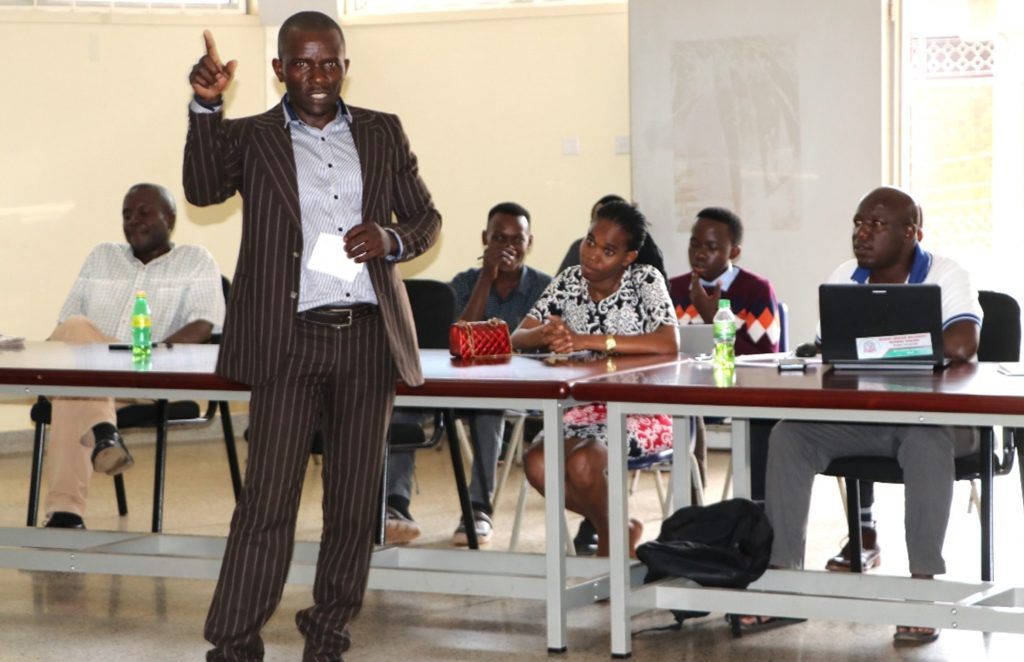
Mr. Kibirige Ponsiano, the Chairperson of the Animal Production Society of Uganda (APSU) said their activities have been running with guidance from the university and their patron Prof. John David Kabasa. He explained the challenges they face as Animal Production Officials arising out of competition with other professions in the field and explained the steps taken so far to have them recognized as professionals in their own right.
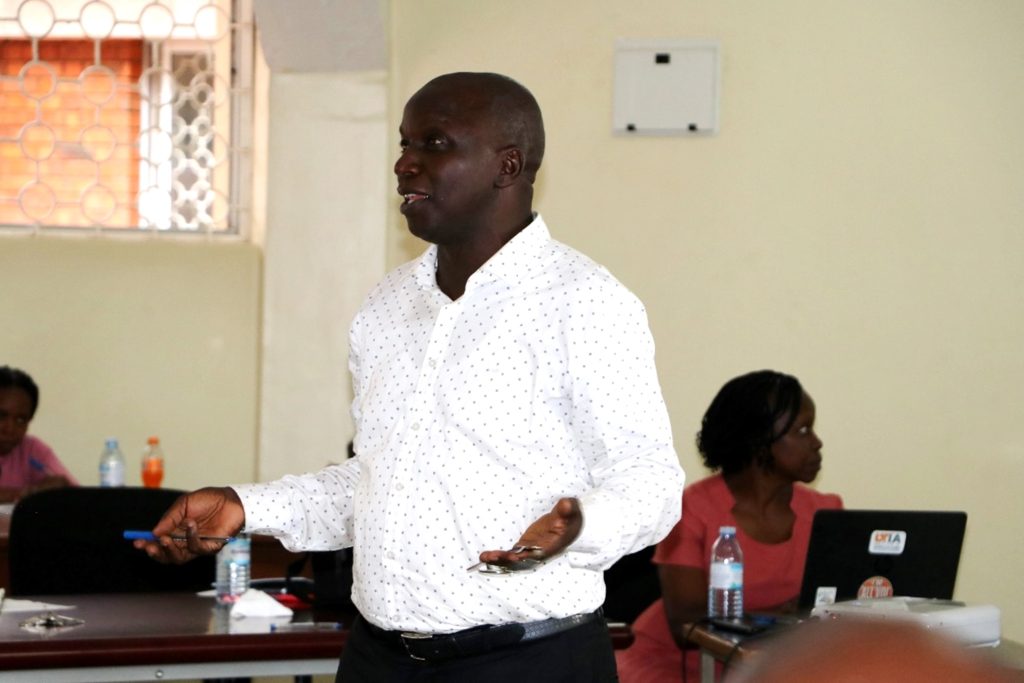
‘I’m humbled to be in this place that has made me what I am, having come to the college as a mature student, he said while appreciating the LIR Department for having considered them in addressing the students. He urged the university, the college, and the departments to find ways of absorbing more of the graduates into their farms, the departments, and the college. He encouraged the students to seek opportunities for further studies and increase their opportunities to work. He encouraged them to find work amongst the farmers instead of fighting for the few places in the formal sector and urged them to go out to farmers with solutions to their problems, which if addressed will help on increasing the farmer’s incomes.
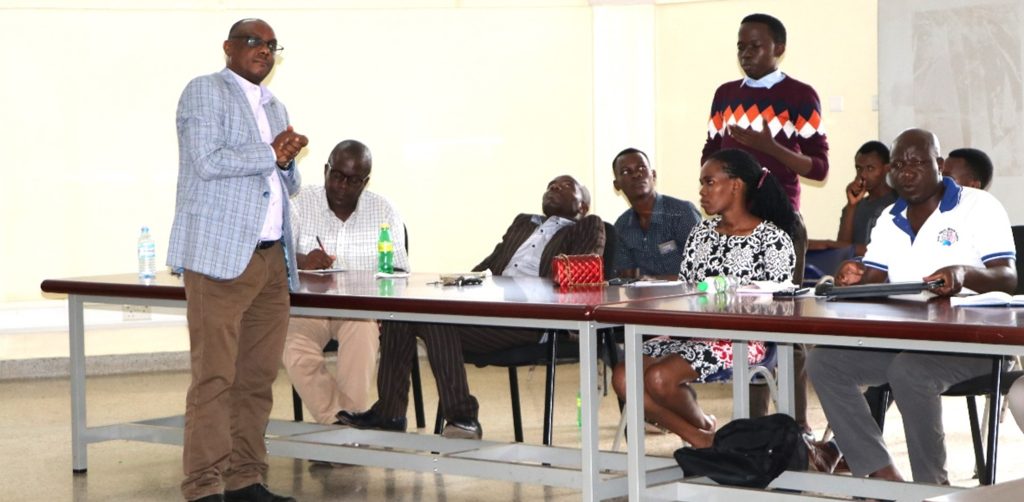
Prof. Anthony Mugisha urged the students to appreciate the difference between learning and education. ‘Are you aspiring to be educated or learned? Are you seeking out jobs or employment?, he queried as he called for a mindset change among the graduates. He explained that the problem at hand was narrowing our perspective in thinking that we train students to get jobs. He said the animal Value chain was so wide that a person could look at the different aspects and work on citing the example of addressing droughts which was identified as a major challenge in animal production.
Further, he clarified the difference between the two programs Bachelor of Bachelor of Animal Production Technology and Management (BAPT) and Bachelor of Industrial Livestock and Business (BILB) saying that the products of BILB were expected to be entrepreneurs, investors, job creators, business owners or business creators with an aim of wealth creation along livestock value chain while BAPT products were expected to be scientists, reaserchers, technologists, managers and extensionists.
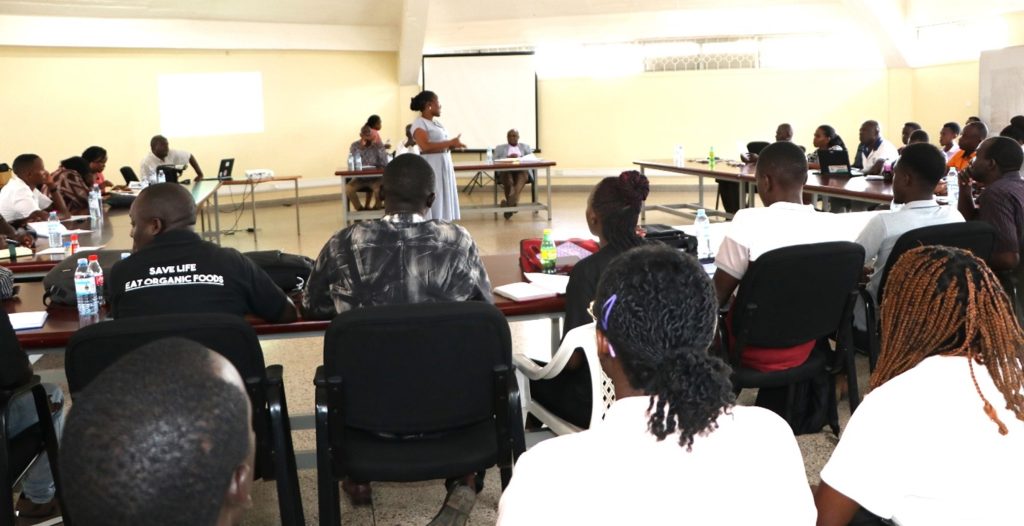
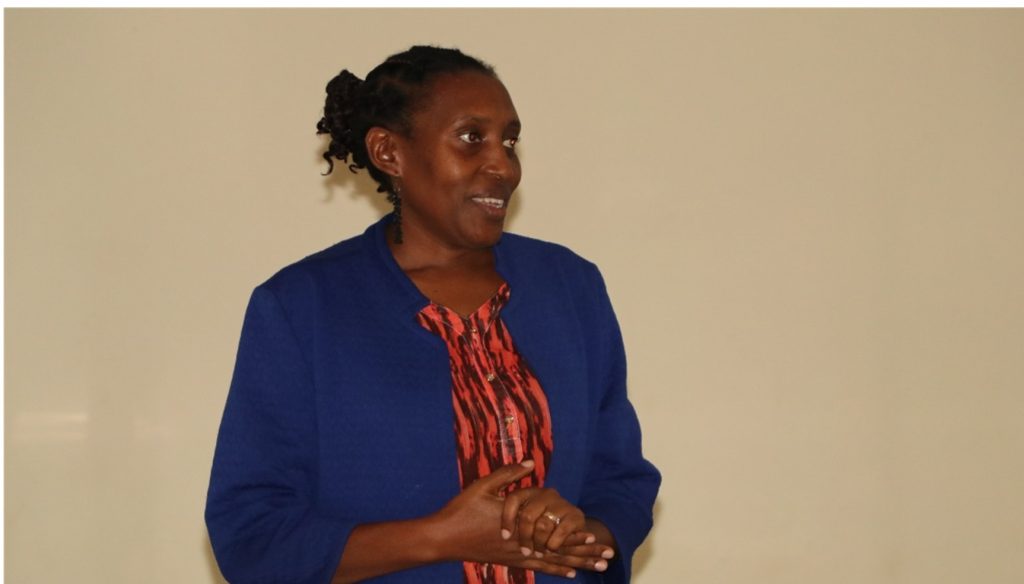
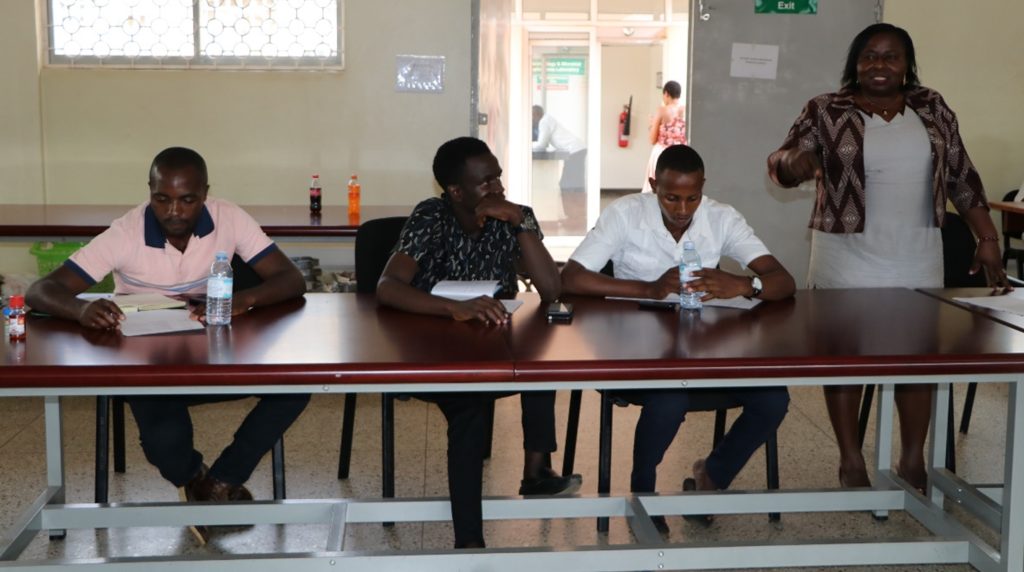
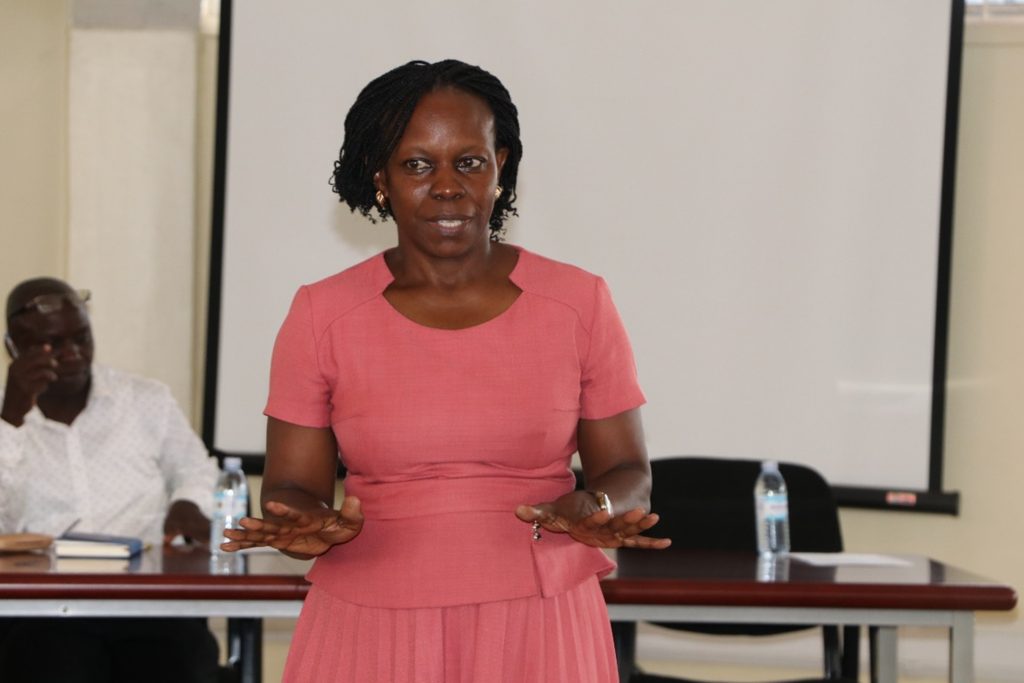
Veterinary & Biosecurity
The Africa Union Inter-African Bureau for Animal Resources (AU-IBAR) mission at Makerere University
Published
1 month agoon
March 13, 2024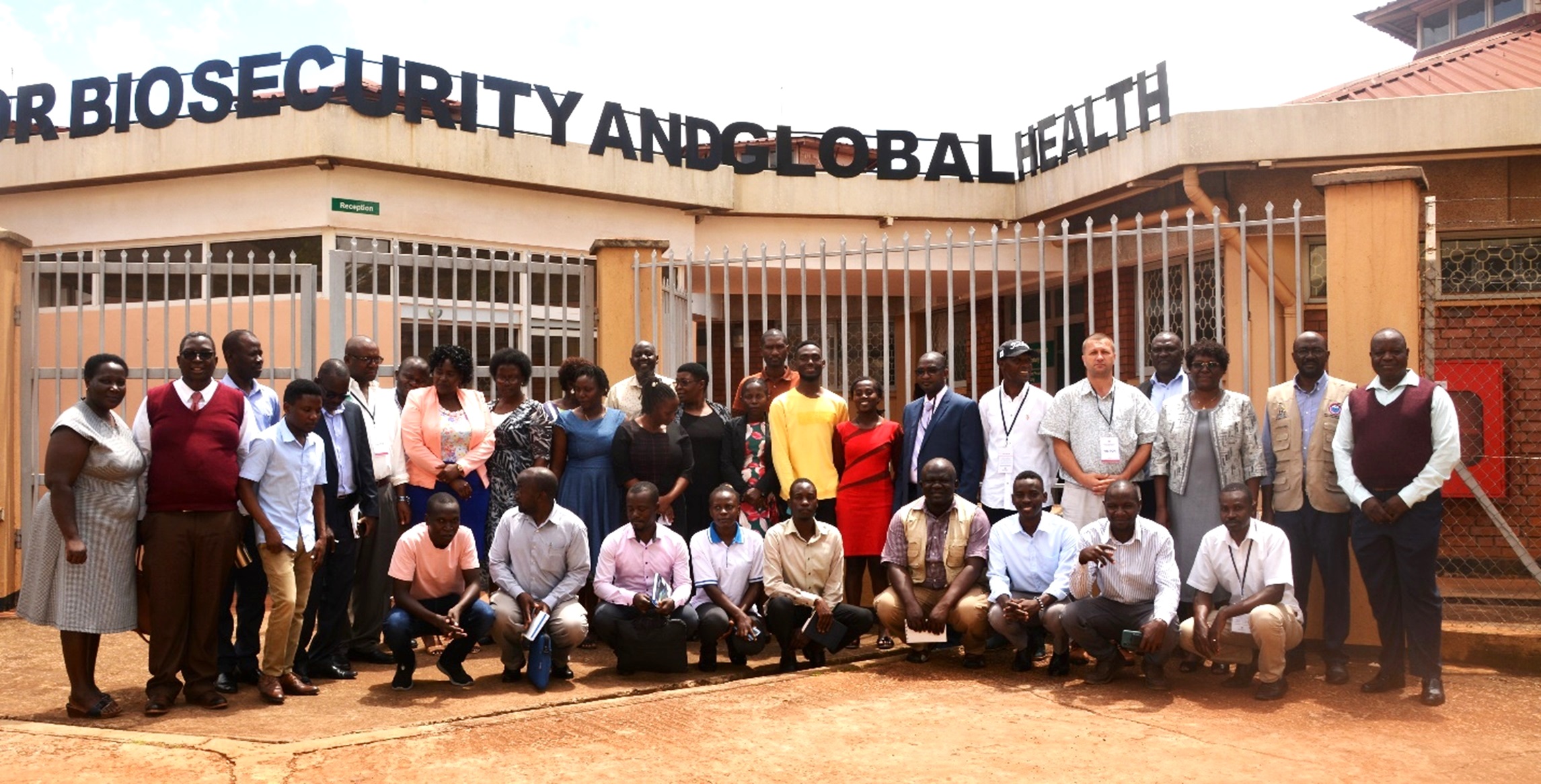
Makerere University has been subjected to an assessment to determine its suitability for hosting a Regional Centre of Excellence in Fisheries and Aquaculture in Africa. The evaluation follows a jointly submitted Expression of Interest by the College of Veterinary Medicine, Animal Resources and Biosecurity (CoVAB) and the College of Natural Sciences (CoNAS).
The Africa Union Inter-African Bureau for Animal Resources (AU-IBAR) mission was at Makerere from 11th to 12th March 2024, specifically at the colleges that offer fisheries related programs, CoVAB and CoNAS where they looked at the suitability of the existing Teaching and Research Facilities and other parameters necessary for the establishment of a center of excellence.
The team comprised of Etienne Hinrichsen the leader together with Patrick Karani, from AU-IBAR, and Daniel Adjei Boateng the Aquaculture Expert on the mission undertook a two-day in-depth review of the state of affairs of Makerere University in order to make an informed decision in regard to its suitability to host the center. According to Etienne Hinrichsen, aquatic animal health has got a leg in various areas and that staff within the institution were better placed to understand this unlike those from outside. He said their excursion in Makerere offered a learning experience that would enrich their evaluation. It is always difficult to evaluate something while on your desk and it gets much richer when you see it on the ground, he said while appreciating the staff that took them around. A lot was seen in terms of physical infrastructure and what remains now is to correlate the human capacity in order to determine what AU-IBAR can do for you or what you can do as a centre of excellence in Africa, he observed. He observed that Makerere University was already collaborating with the National Fisheries Resources Research Institute (NaFFIRI), which was an advantage because of the good relations it has with AU. Other areas of concern he said, include accessibility matters for international students since the centre will serve the entire continent.
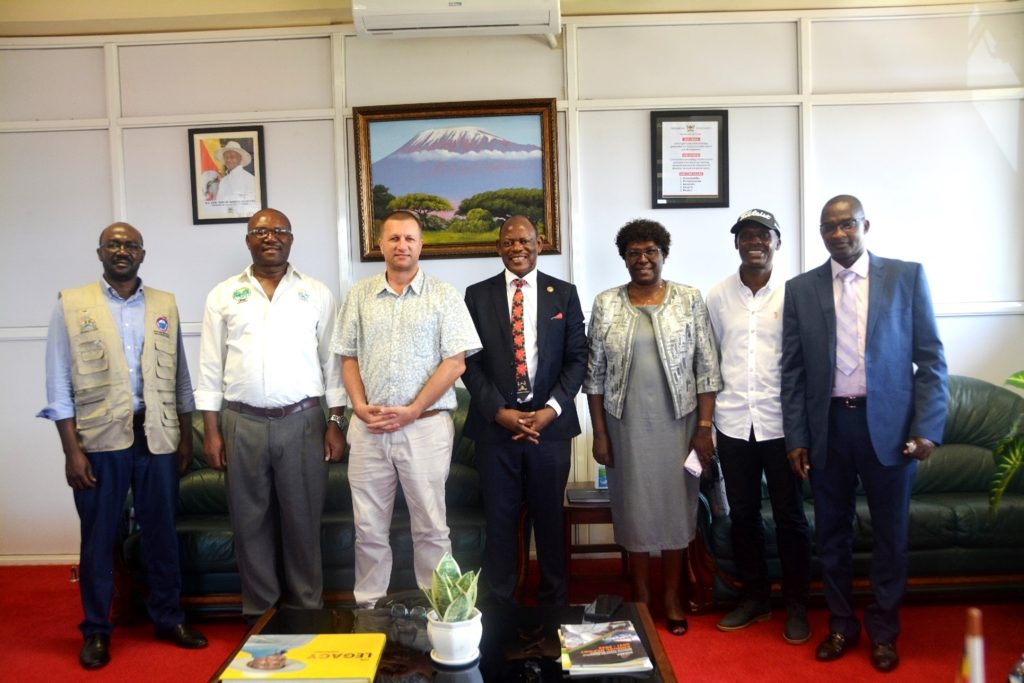
While interacting with the AU-IBAR mission, the Vice Chancellor, Prof. Barnabas Nawangwe, expressed optimism that Makerere University was best suited to host the center since it had in place all that was needed to offer the required trainings and research. He said the university’s move towards becoming research led and the various policies and facilities in place were a fertile ground for taking on training in the fisheries sector, an area that was increasingly getting onboard due to the demand for fish in the country and the region. ‘If the AU mission is to give us opportunity to do even better in what we are doing, I will be very happy,’ he said adding that the university was a host of students from 39 other countries who would also be beneficiaries since Uganda has a big coverage of lakes and rivers coupled with the increase in the fish farming enterprise. Further he said with the exploding population in Africa, unless we find solutions for food security, we must be prepared for very unstable people in the near future, justifying the reason why Makerere University should host the centre of excellence.
The mission interacted with a section of members of staff and graduate students both at CoVAB and CoNAS.
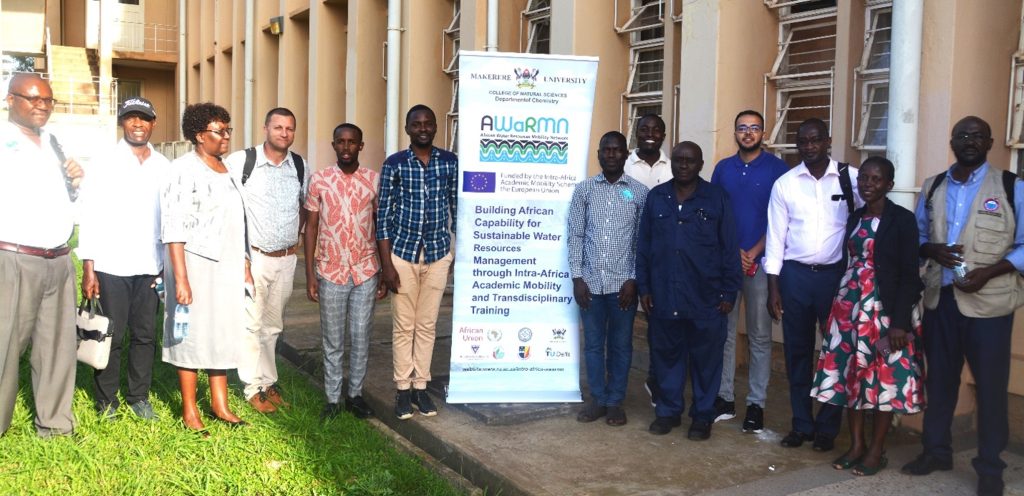
The AU-IBAR verification visit to Makerere University as one of the institutions for selection as Africa Centers of Excellence in Fisheries and Aquaculture reviewed a number of areas including
- existence of the relevant curricula;
- related disciplines taught in the institution;
- number of staff in disciplines like qualification and years and nature of experience;
- Percentage of students from each cohort that have graduated from the institution over the past;
- capacity to undertaken research and develop new information and technology;
- peer reviewed publications, popular articles and other information targeting stakeholders;
- relevant policies, administrative and financial management systems in place.
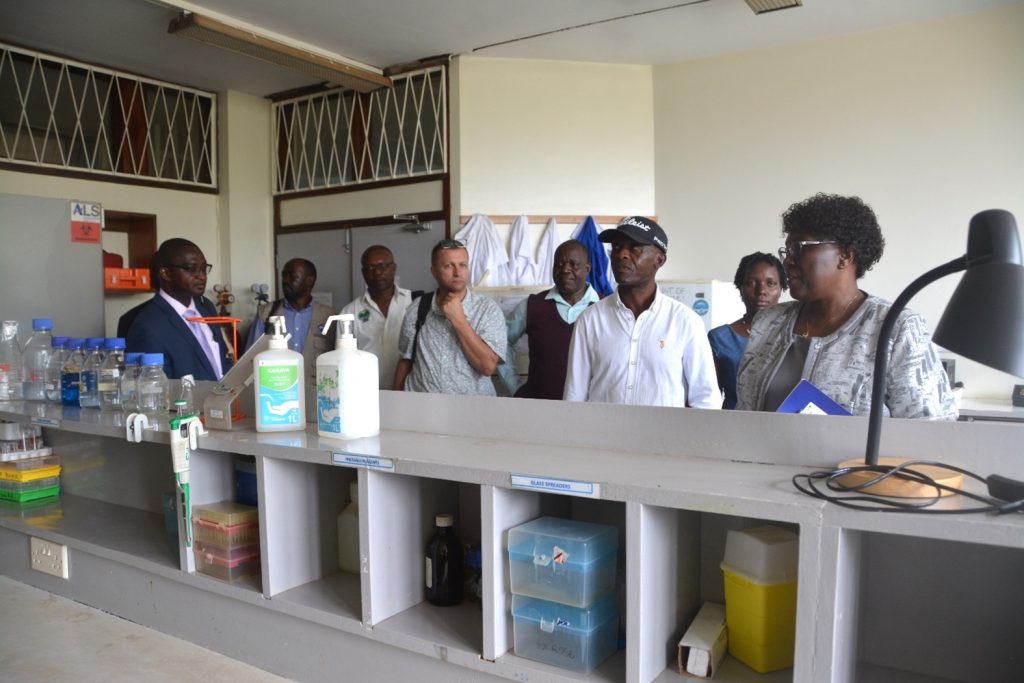
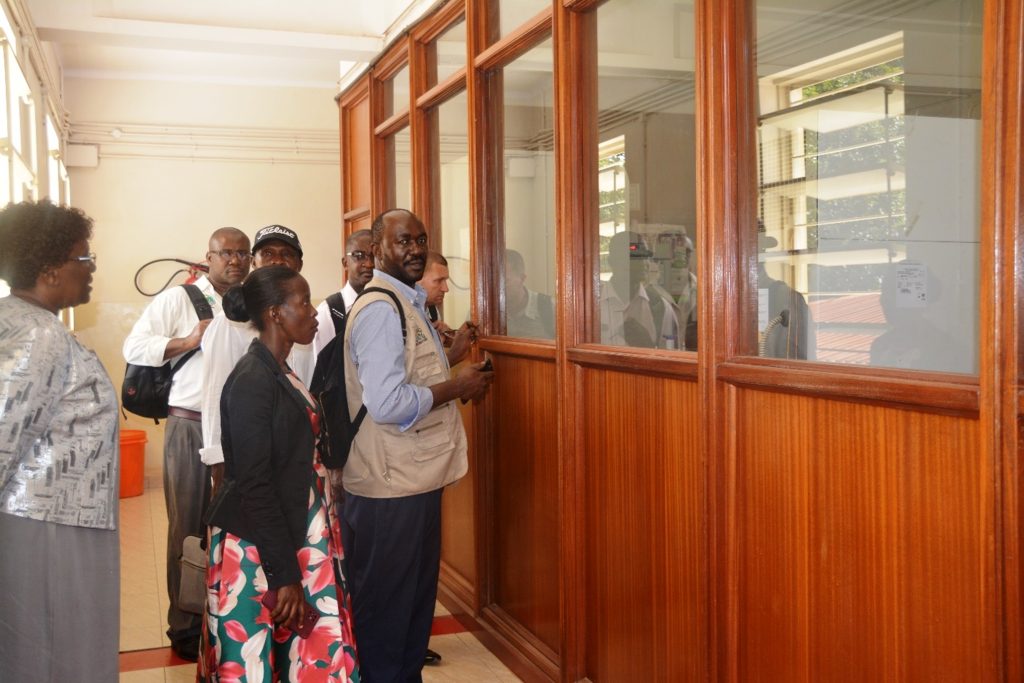
Once selected, Makerere University will champion the training in Fisheries and Aquaculture through graduate training in Masters, PhD and short-term courses, as well as applied research in the form of partnerships and collaborations with other institutions and the private sector.
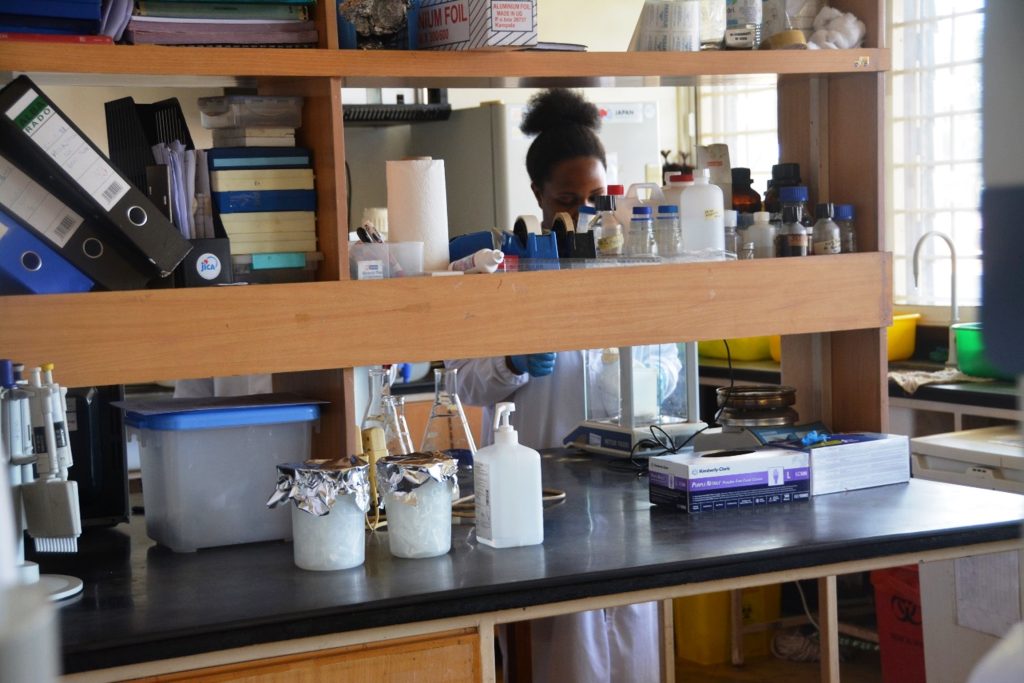
Makerere University hosts the Africa Center of Excellence in Materials, Product Development and Nanotechnology (MAPRONANO ACE) and Makerere University Regional Centre for Crop Improvement (MaRCCI).
Pictorial
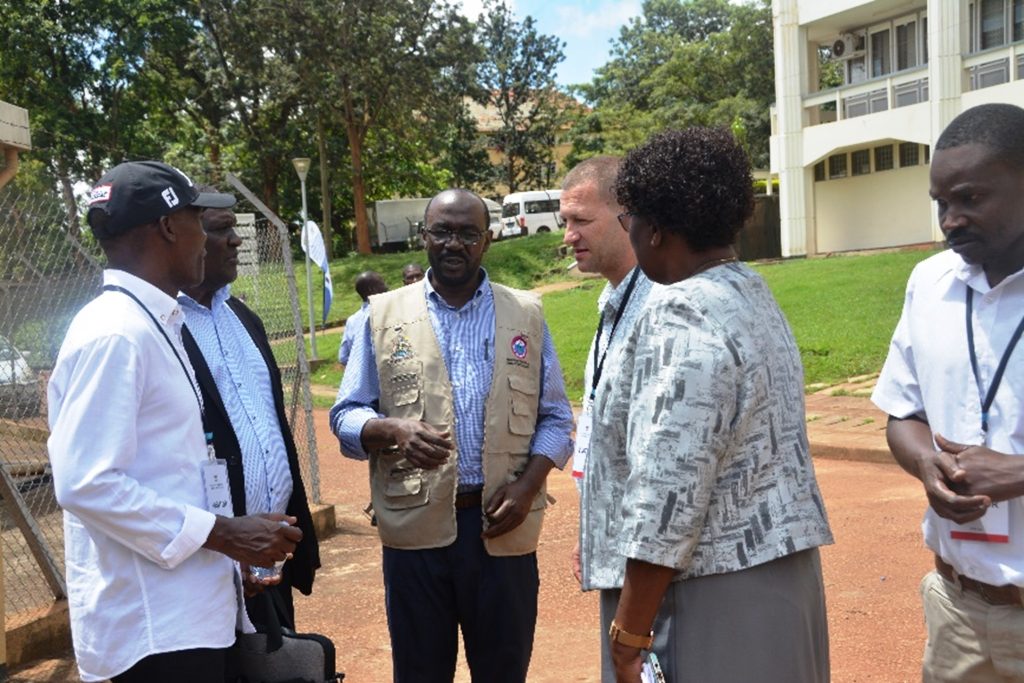
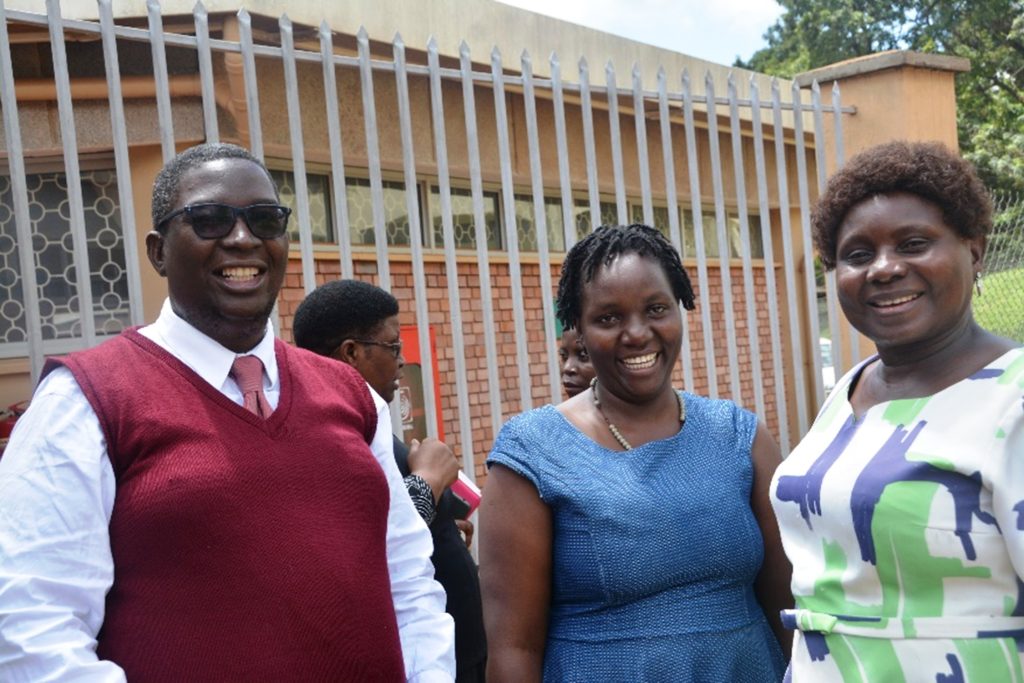
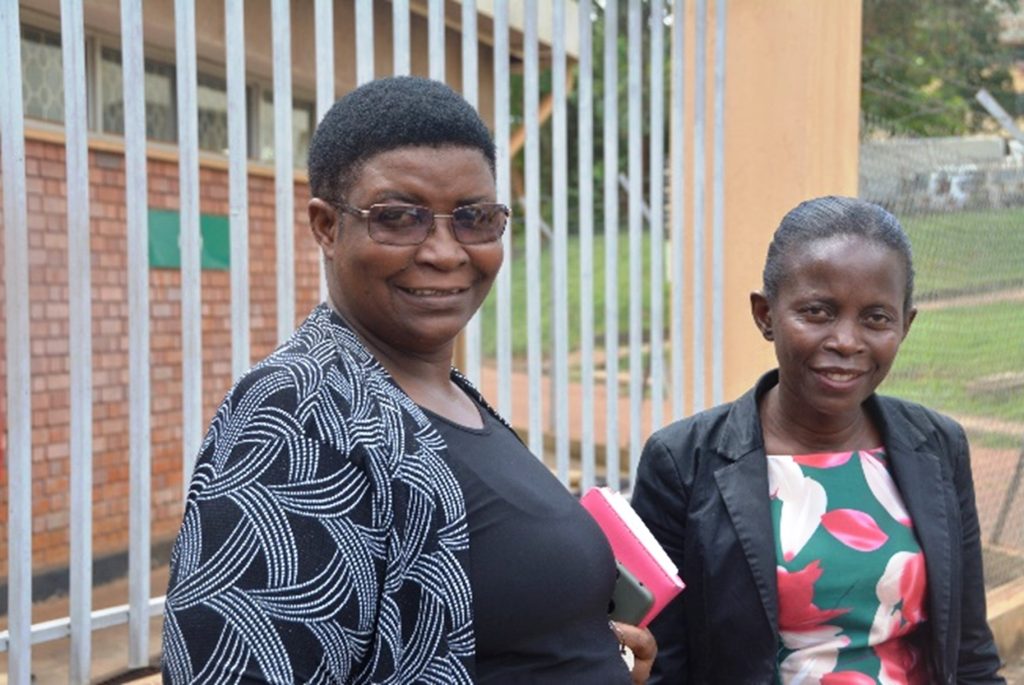
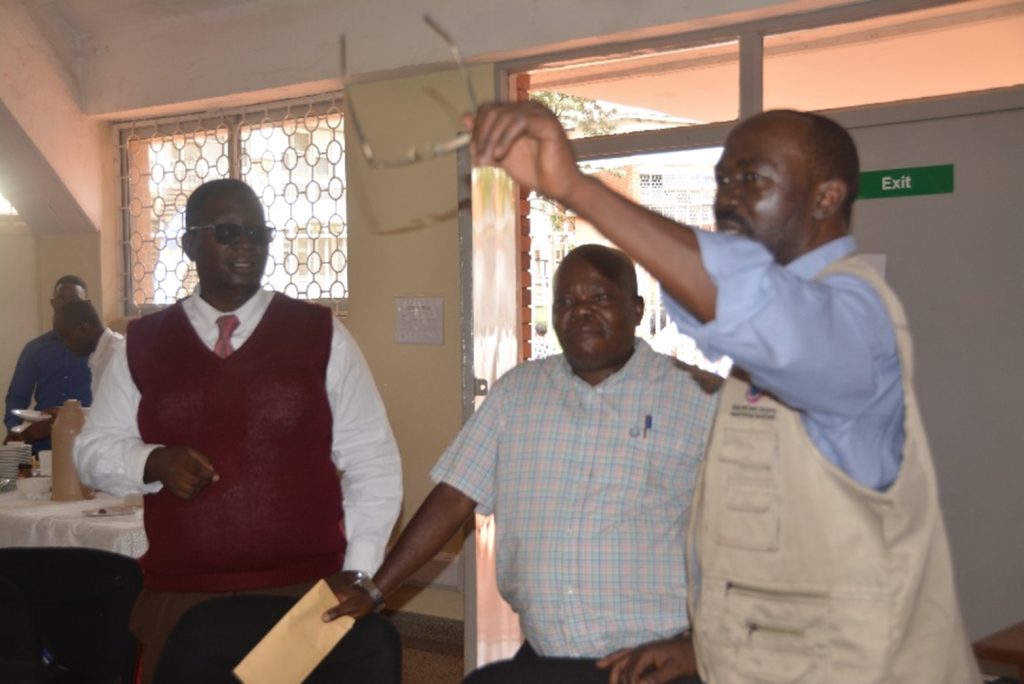
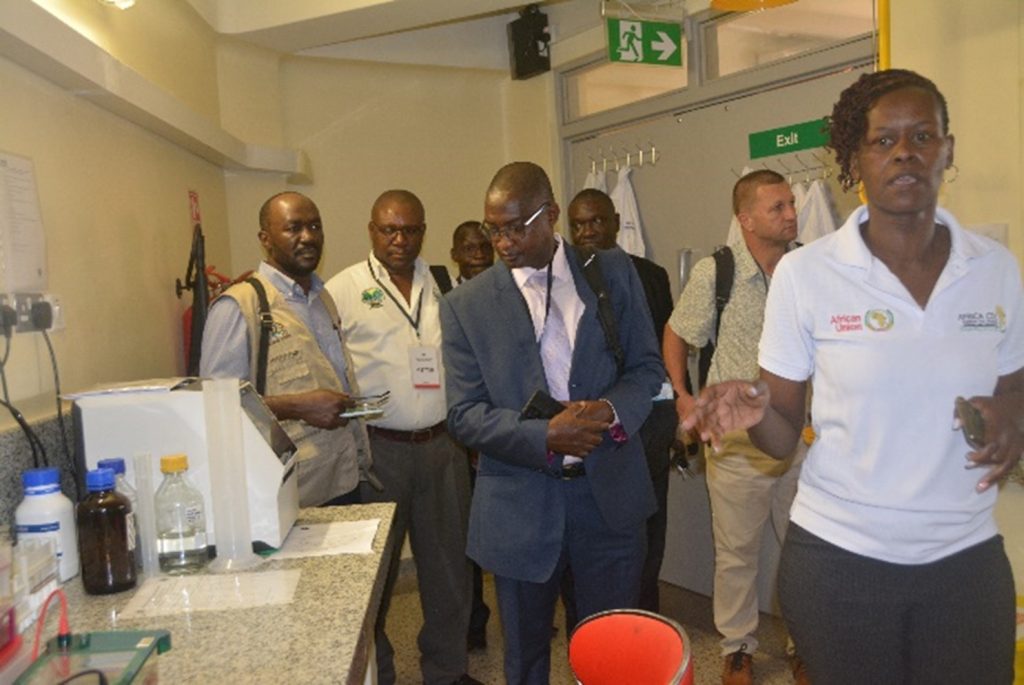
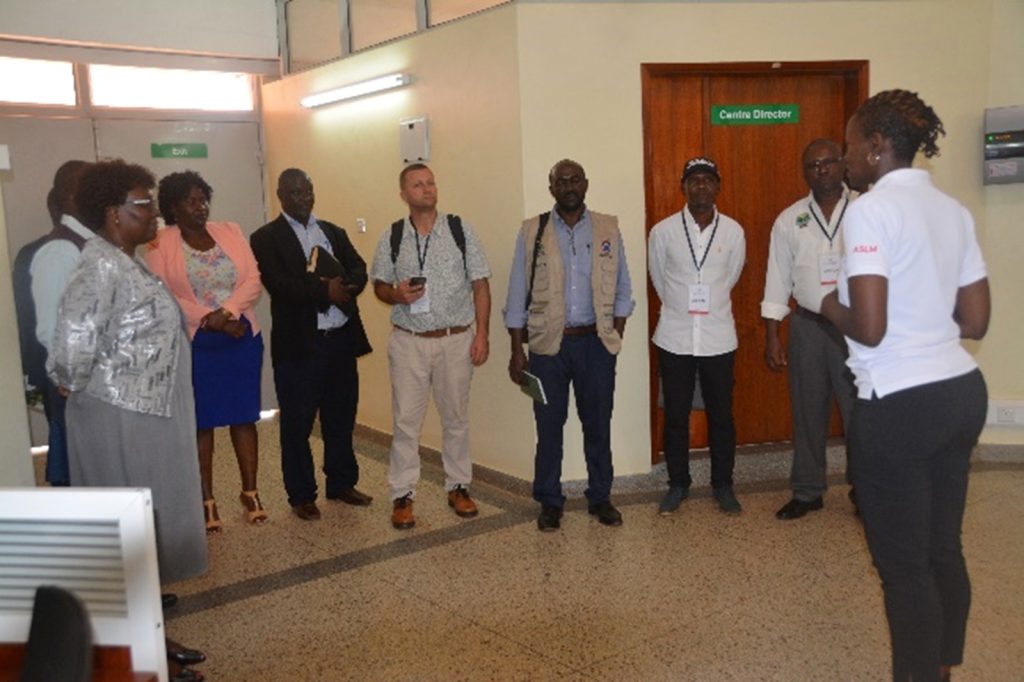
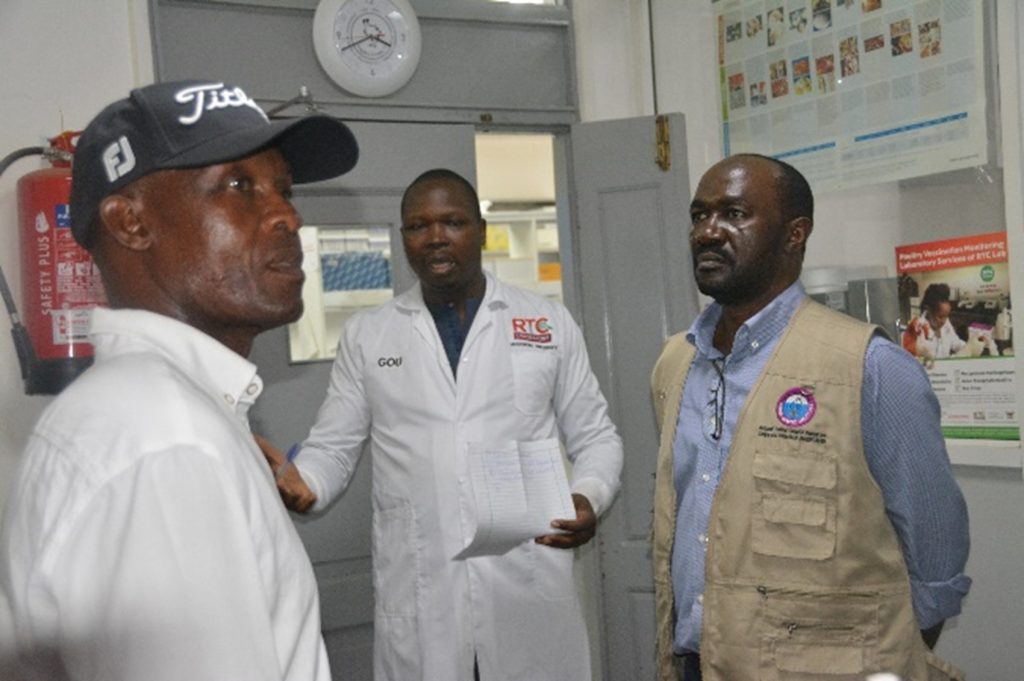
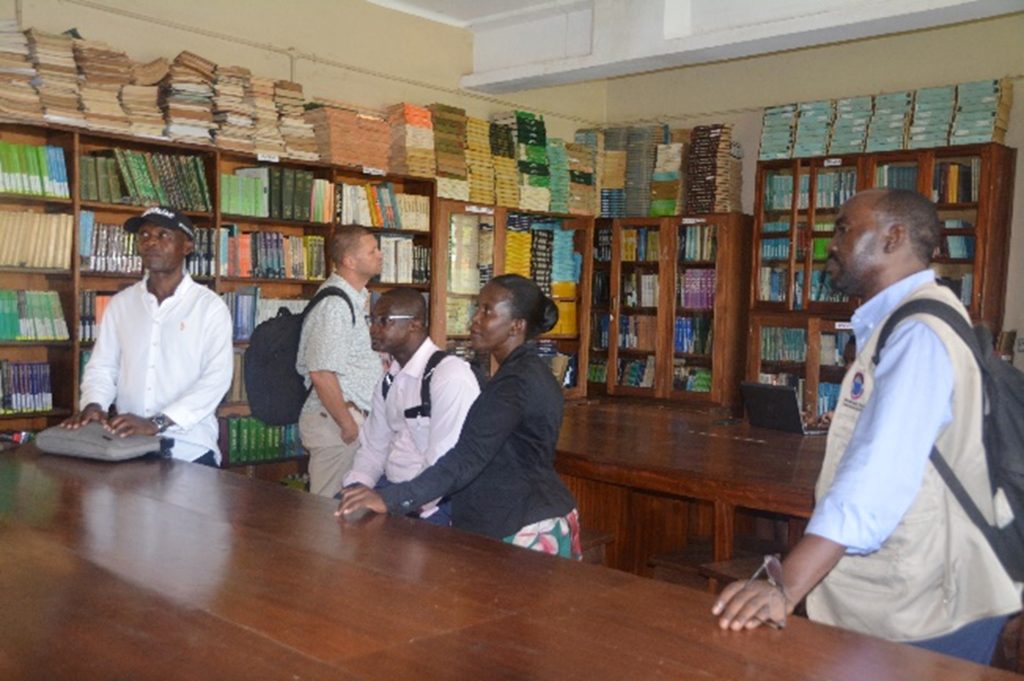
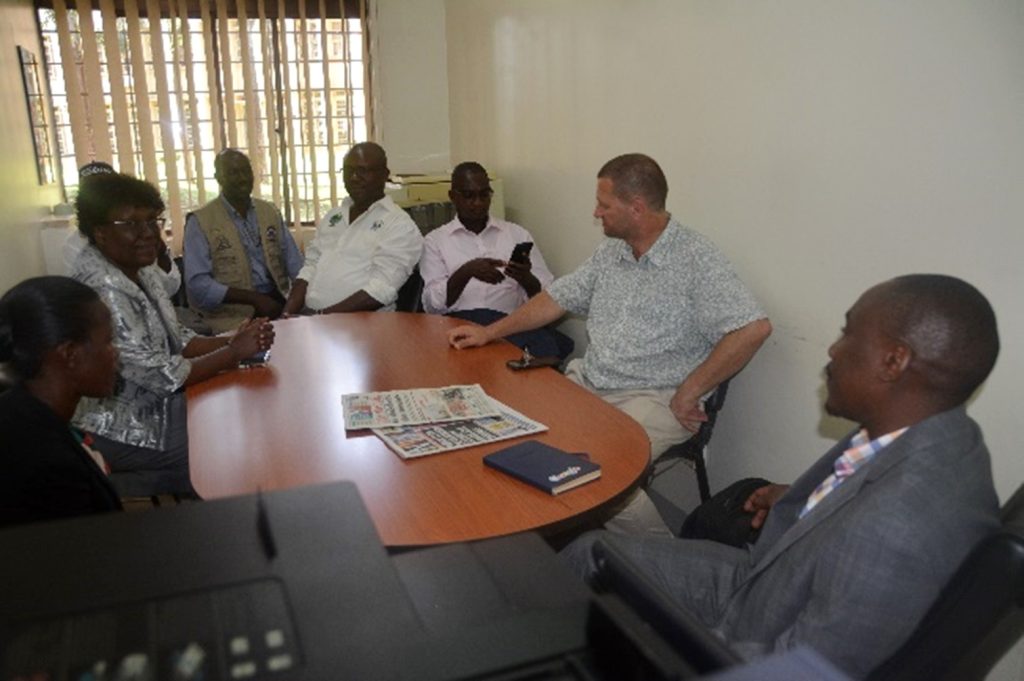
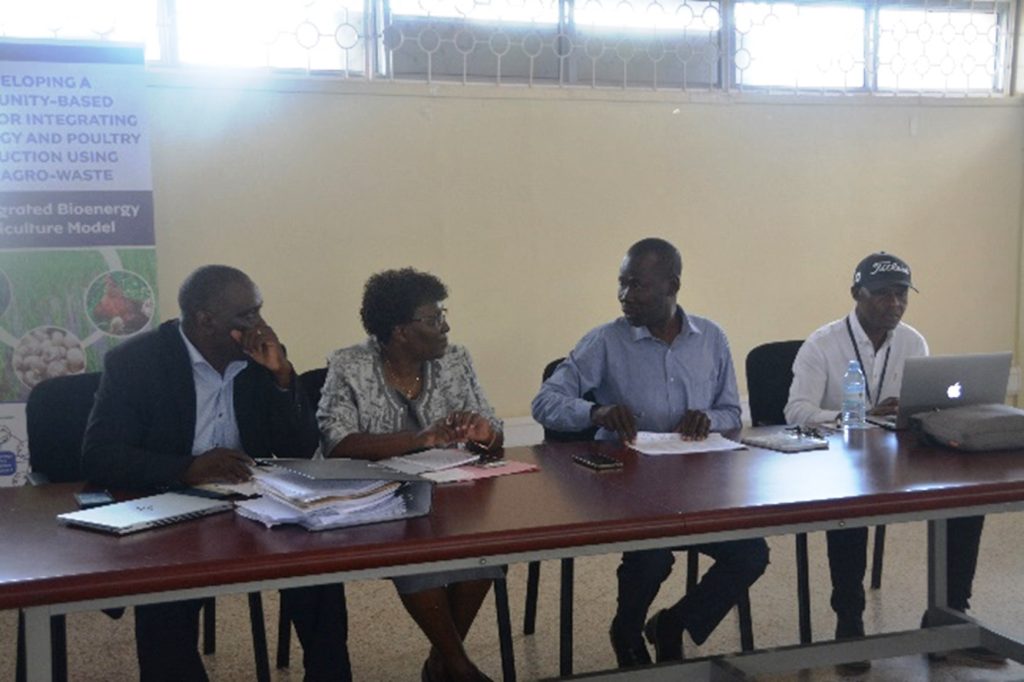
Veterinary & Biosecurity
COVAB’s outstanding Researchers recognized during the 74th Graduation Ceremony
Published
3 months agoon
February 2, 2024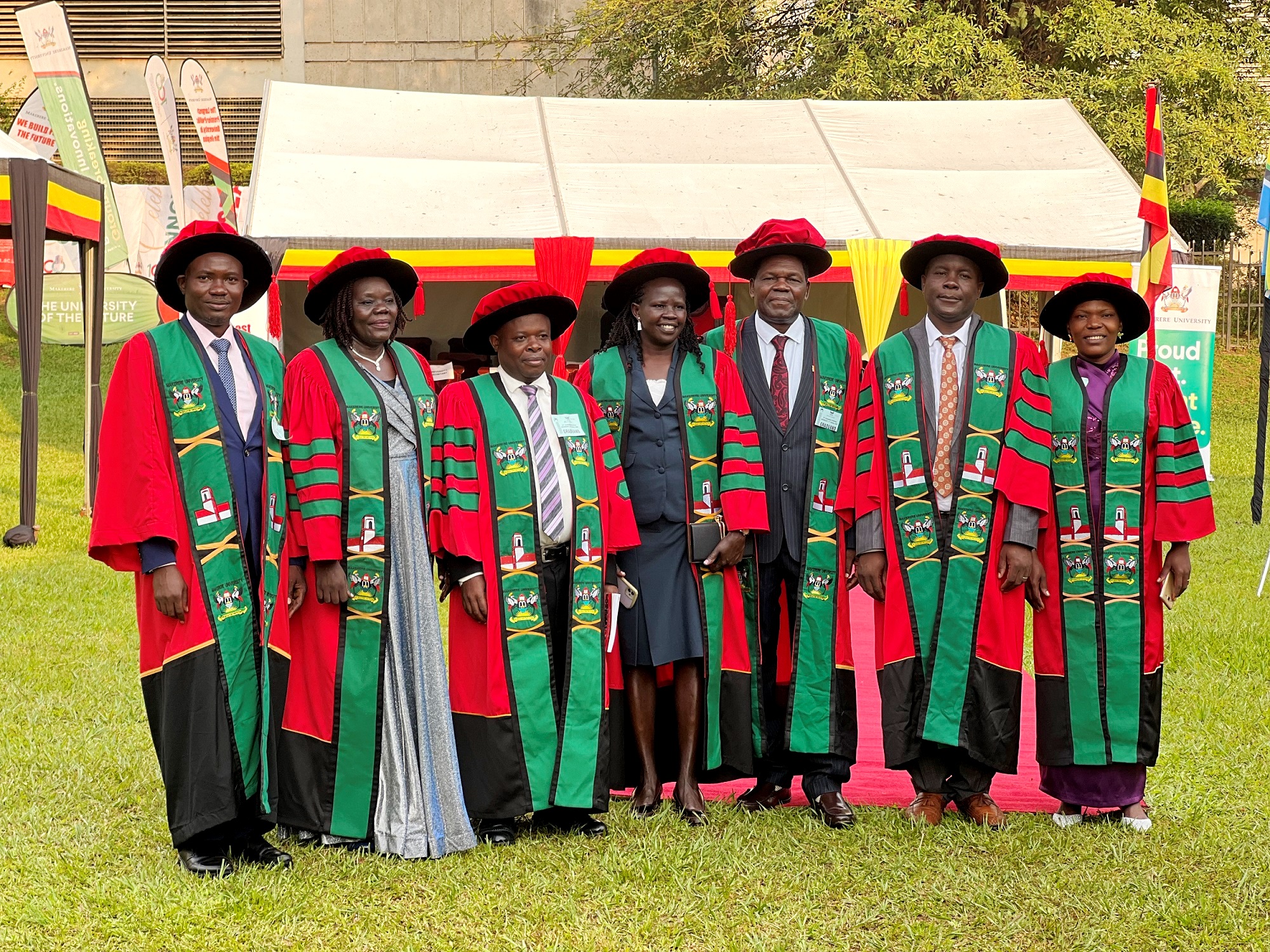
Five of the best researchers from the College of Veterinary Medicine, Animal Resources and Biosecurity (CoVAB) were during the 74th graduation ceremony recognized for their outstanding contribution to the body of knowledge. They included Dr. Enoch Matovu with 48 publications, Dr. Eddy Wampande with 37, Prof. Denis Byarugaba with 36, Dr. Kato Drago with 33 and Prof. Frank Nobert Mwiine, who is also the Principal CoVAB with 30. These were some of the beneficiaries of the inaugural Makerere University Vice Chancellor’s Research Excellence Awards given to all Colleges and the University Library.
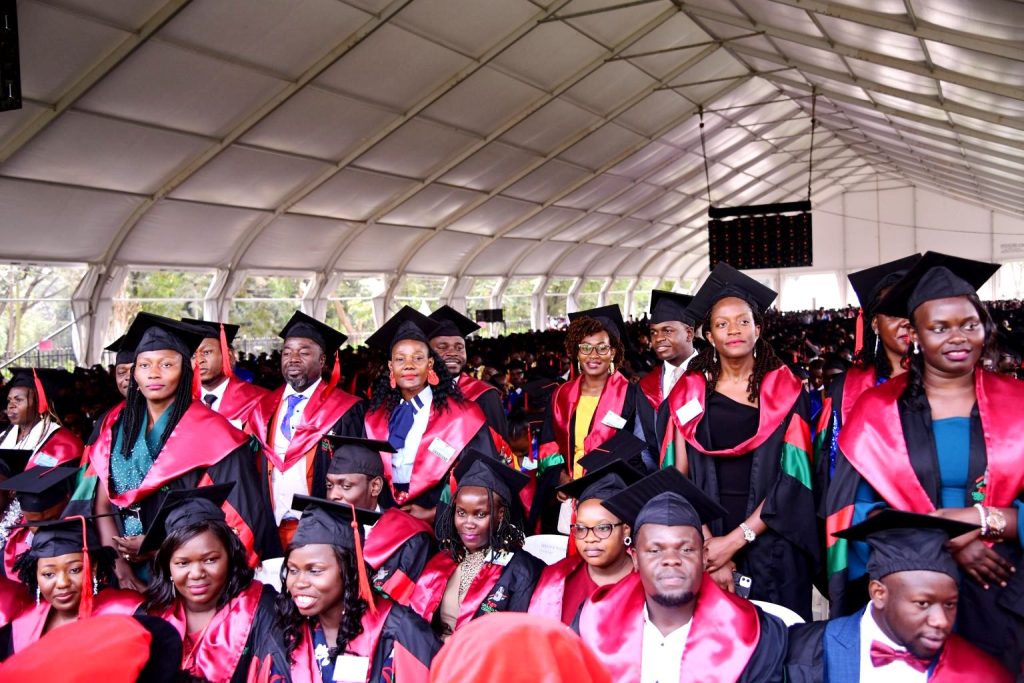
The graduands that the college presented included 7 Ph.Ds, 58 with Masters Degrees, 212Bachelor Degrees and 5 with Post graduate Diplomas. The PhD Graduands were Agutu Claire, Atim Stella, Driciru Margaret, Kizza Daniel, Mayanja Martin Nsubuga and Othieno Emmanuel.
While making his pronouncement on day three of the 74th graduation ceremony on Wednesday 31st January 2024 when CoVAB presented her students, Prof. Nawangwe noted that with support from various partnerships, the University’s research output in terms of innovations and publications had increased. He said the recognition of outstanding performers in research and publication was based on the highest number of publications between the year 2017 and 2023 according to the Scopus database. He urged all staff to continue conducting research on national development priorities as well as matters of global interest and publishing their work in high-impact journals so as contribute to the university’s drive to become research-led.
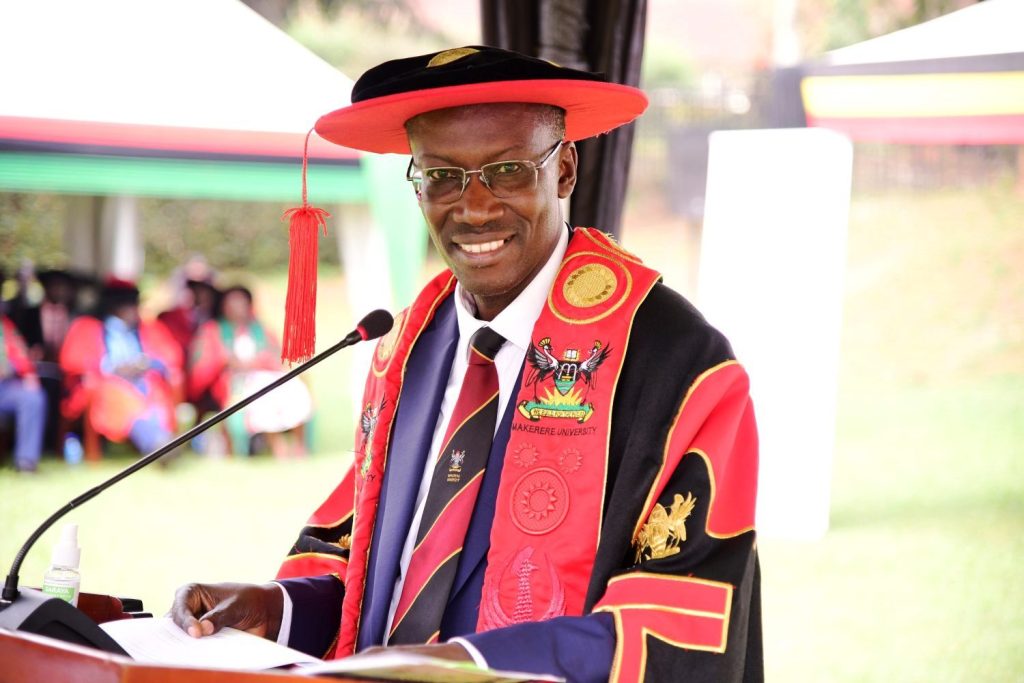
The College was applauded for the increased research output and community outreach initiatives, that not only helped to improve on food security but also support efforts towards combating disease. Prof. Barnabas Nawangwe pointed out that the college was spearheading the development of the anti-Tick Vaccine and that the Trials of this vaccine were on-going in several districts with promising results. He said the College entered into a memorandum of understanding with a private company to produce the vaccine commercially. He however noted that there were attempts to frustrate this project which is one of the Presidential initiatives and pledged to undertake further investigations and inform the appropriate authority accordingly.
Research, Innovation and Outreach.
In the area of research, Prof. Nawangwe said CoVAB as a College has continued to excel in research and community outreach in a number of Biomedical and Applied research projects with support from the Government of Uganda, through the Science, Technology, and Innovation secretariat, Office of the President. The college, he said, has been supported to establish a Biomarker discovery and translation research laboratory at COVAB. Under this initiative, Government has procured over twenty-eight (28) pieces of equipment to support the development of point of care diagnostic kits for infectious and non-communicable diseases including cancer. The goal is to translate identified biomarkers into point-of-care diagnostics for both human and veterinary medicine. In addition, the platform supports drug target discovery and elucidation of drug action mechanisms.
Furthermore, the College staff were involved in investigating the genetic markers for tolerance of the tsetse fly transmitted “Nagana” disease by some indigenous cattle, in order to inform programs to raise cattle breeds that can survive and remain productive in tsetse infested areas. This is complemented by an EU funded “COMBAT” project that aims to evaluate the socioeconomic burden of Nagana, identify and type the circulating trypanosome parasites, as well as determining biochemical and immunological markers for disease tolerance, towards progressive control and elimination of this animal disease as a major constraint to animal productivity and economic prosperity.
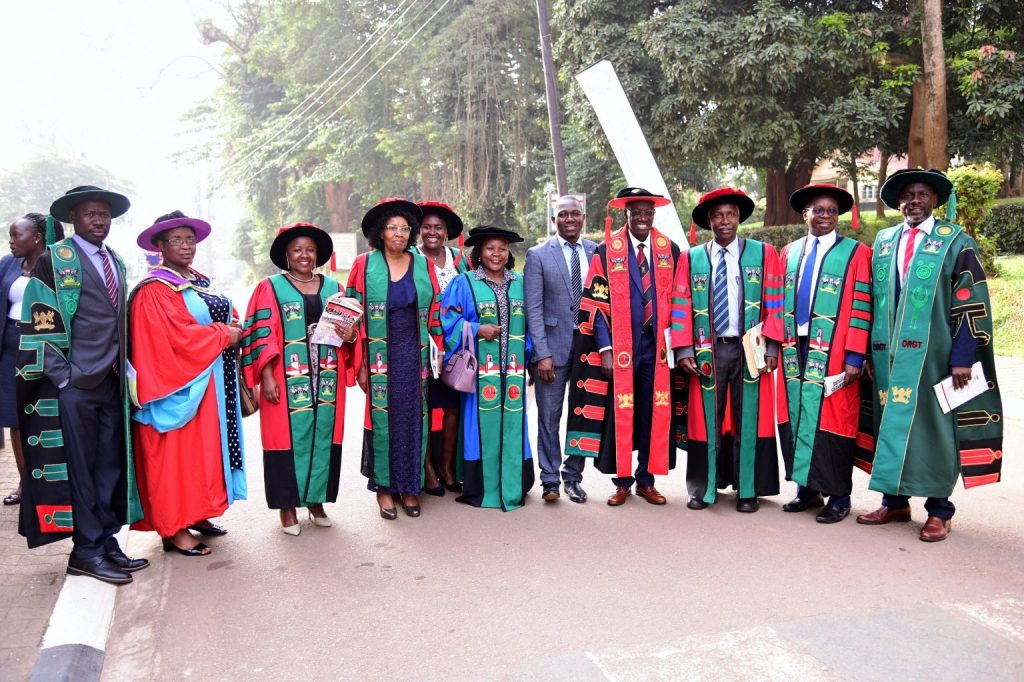
Improved Laboratory infrastructure
The Vice chancellor said with support from the Science, Technology and Innovations-Office of the President (STI-OP), CoVAB benefited from the laboratory infrastructure and technical capacity improvement. A Central Laboratory Animal Research Facility to support pre-clinical studies in animal models for vaccines, therapeutics and diagnostics was set up. This is alongside refurbished laboratories at Biosafety Levels 2 and 3 (BSL2, BSL3), fitted with state-of-the-art equipment to execute cutting edge basic and applied research.
Using COVID-19 as a model, the college was in advanced stages of development and production of 1 vaccine and 1 diagnostic, while ably supporting similar endeavors by other partners such as UVRI. Noteworthy was that the established infrastructure and research platforms can be applied to all diseases. This, he said, strategically places the college and Makerere at large in position to confront major animal and even human health challenges as significant proportions of emerging and reemerging infectious diseases are of animal origin (Zoonotic).
Electronic Rabies Surveillance using a One Health Approach
In the area of combating Rabies in the country and the region, the Vice Chancellor noted that the College with support by the Swiss Government was championing the elimination of Rabies through the use of electronic surveillance. Rabies, he observed, is a global challenge being a zoonotic disease affecting the entire world more so here in Africa where there is close interaction between the wild animals and the human population. Using a one health approach, the college with partners that include the University of Zurich is working with graduate fellows and other stakeholders drawn from Ministry of Health and Ministry of Agriculture, Animal Industry and Fisheries, and Uganda Wild life authority among many others.
The Norbrook Veterinary Academic Excellence Award 2024
While recognizing the contribution by various partners in the realization of the Core mandate of the University, teaching and learning. Prof. Nawangwe mentioned such organizations including Norbrook (U) Ltd, who since 2021 continue to prize the best performing Veterinary students with cash prizes of Fifteen Million (15) Shillings annually. ‘We are gratified to note that these Veterinary excellence awards that were launched as part of the golden jubilee celebration of veterinary education in Uganda since the opening of the faculty of Veterinary Medicine in Uganda in 1971, are still on and running’, he said, while congratulating Norbrook (U) Ltd, the University and CoVAB management and the recipients of the award during this 74th Graduation ceremony namely; Kawuma Denis who scored a CGPA of 4.36, Kyomukama Baker Raymond who scored a CGPA of 4.25, and Atutambire Jonathan who scored a CGPA of 4.17.
Appreciation of Government Support
Nawangwe pointed out that it would not be possible for Makerere University to realize all these achievements had it not been for the unwavering support of the Visitor, the Minister, Parliament and the entire Government. He conveyed his appreciation to the President and the entire Government for the continued support to Makerere University, especially the support to staff welfare and the Research and Innovation Fund. ‘We once again pledge our commitment to serving our country with maximum dedication through training of highly skilled human resource, research for development and support to Government programs including the Parish Development Model and measures aimed at achieving the Sustained Development Goals’, he committed.
A Word to the Graduands
The Vice Chancellor, while addressing himself to the graduands said Graduation Day was the most important and most memorable day in the life of any scholar. It is not only a license to succeed in life, but also a license and a privilege to serve humanity. ‘You have worked hard to get a degree or diploma from one of the best universities in the World. This is a license for you to succeed in whatever you choose to do in your life career. But always remember that success will only come with discipline and hard work, while honoring your parents and fearing God’.
The Awards
Later in the evening, the best researchers from the college, and the best graduands received their certificates and cash prizes respectively during a luncheon organized by Makerere University Convocation, presided over by Dr. Joseph Muvawala, Executive Director, National Planning Authority. The event, the first of its kind was held under the theme ‘Career Beyond Degrees’.
Trending
-
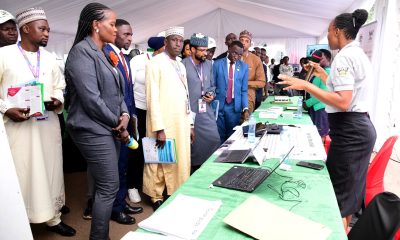
 Computing & IS1 week ago
Computing & IS1 week agoFree Course: Introduction to Data Science
-
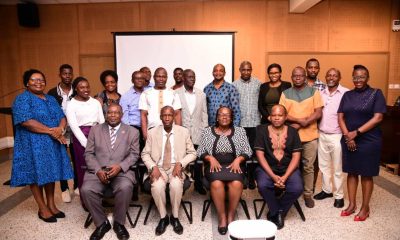
 Education5 days ago
Education5 days agoGovernment Asked to Make Fine Art Compulsory in Secondary Schools
-

 General1 week ago
General1 week agoProf. Justin Epelu-Opio, Our Longest Serving DVC Rests
-
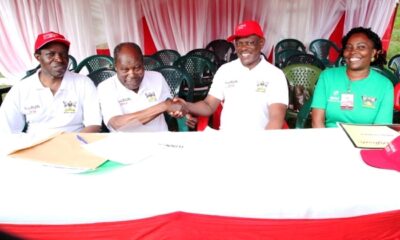
 General1 week ago
General1 week agoDr. Martin Aliker – Celebrating A Life Well Lived
-
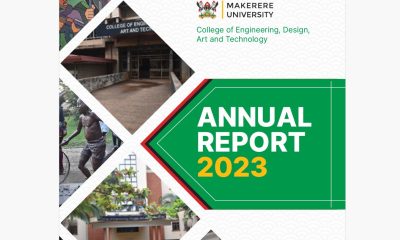
 Engineering, Art & Tech2 weeks ago
Engineering, Art & Tech2 weeks agoCEDAT Annual Report 2023
